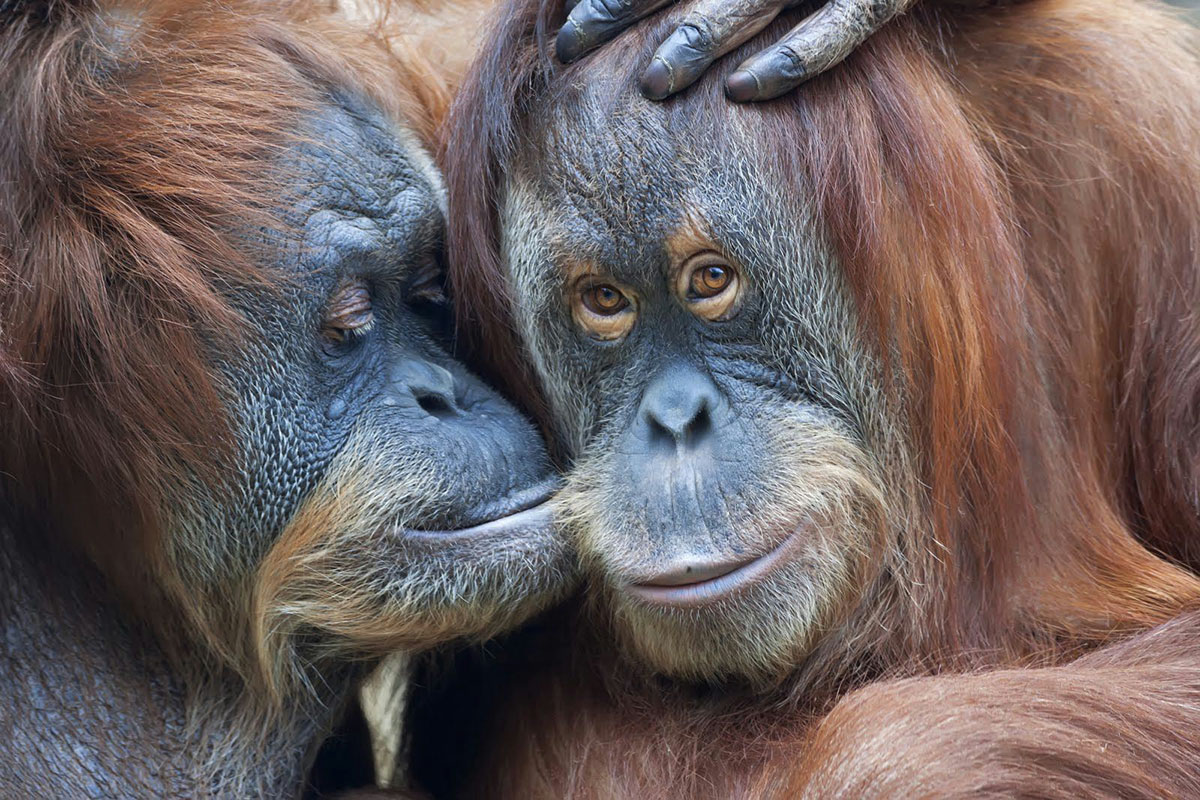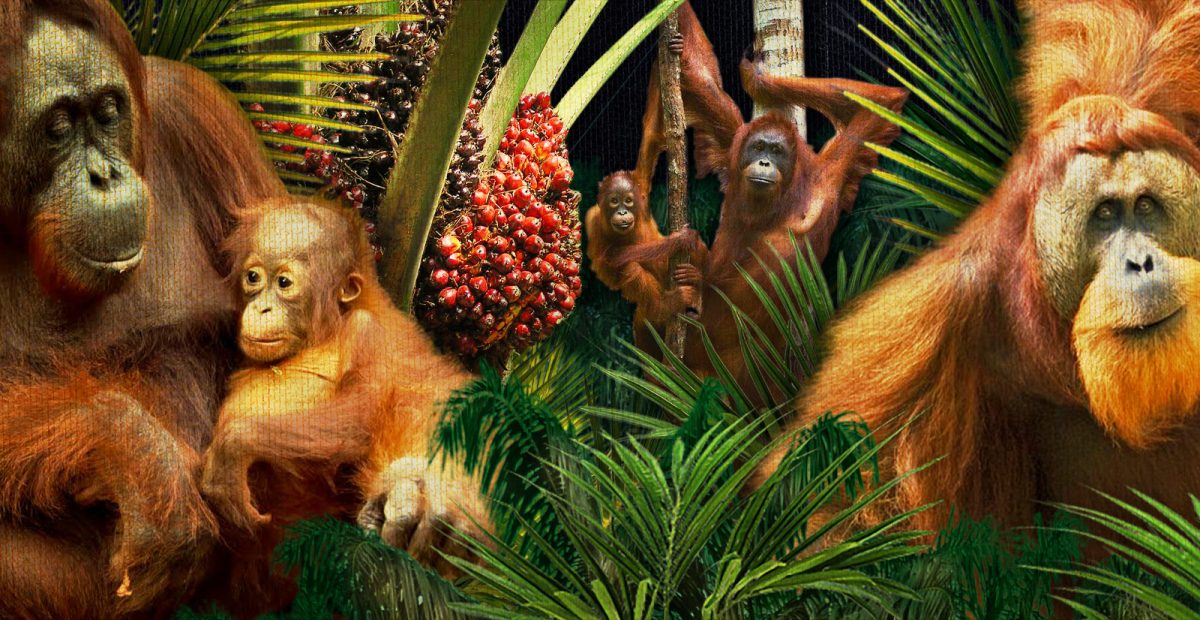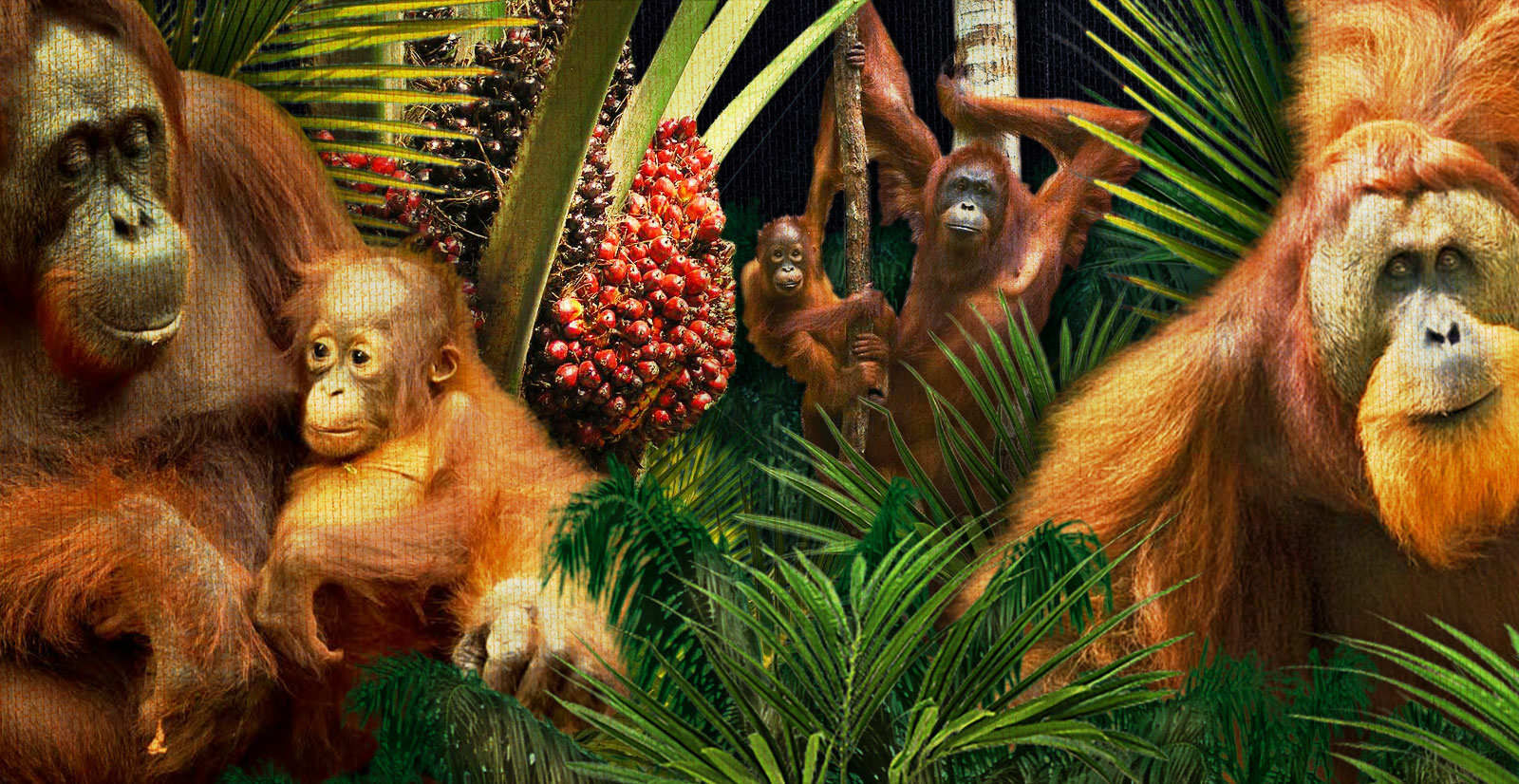
Current Situation
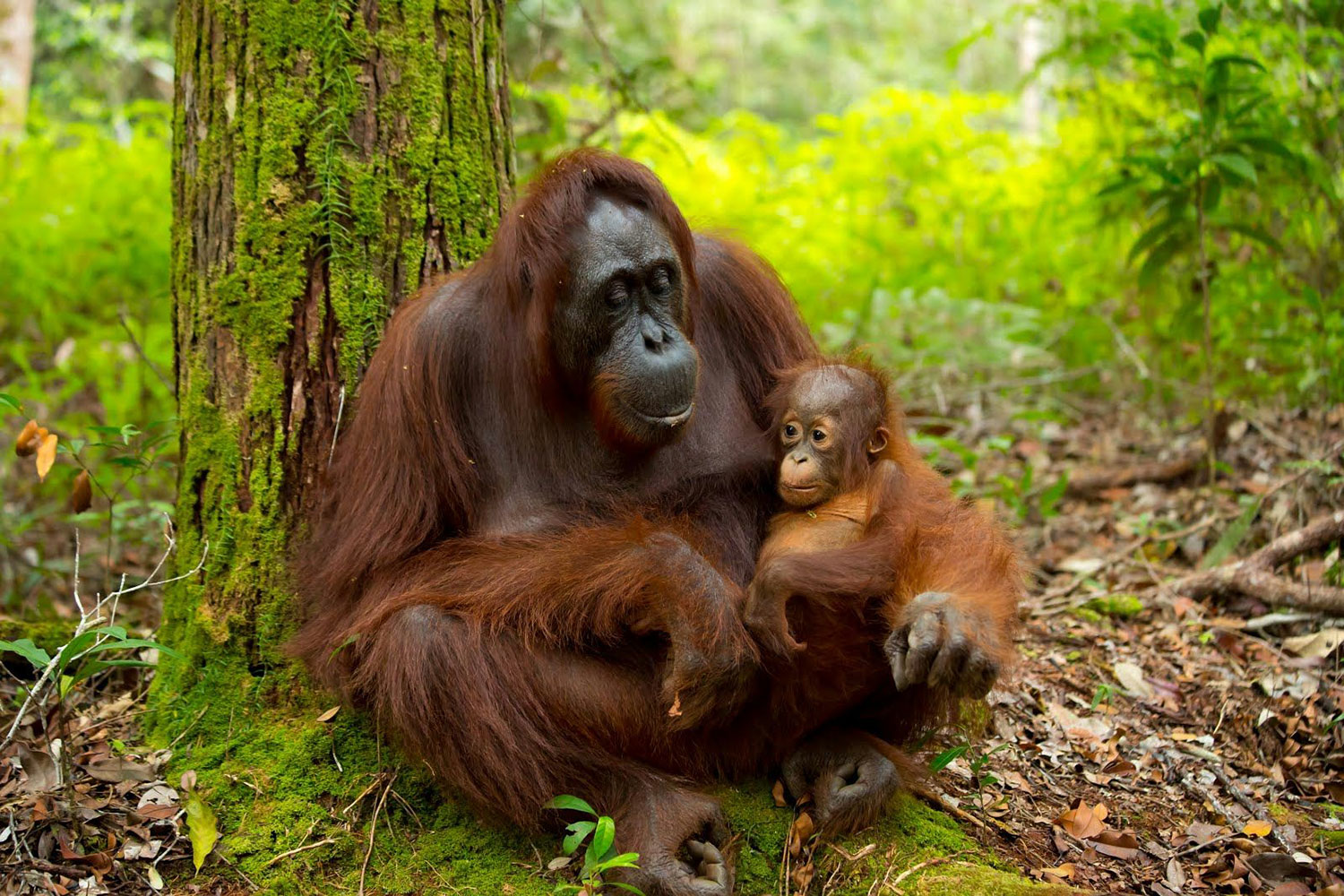
In the prehistoric past, millions of orangutans roamed the forests of Asia. They are now found on just two islands, Sumatra and Borneo, located in Indonesia and Malaysia. The orangutans found on each island are two genetically distinct species, the Sumatran orangutan and Bornean orangutan. In the early 1900s, over 300,000 Sumatran and Bornean orangutans lived in the lush tropical rain forests of the two islands. Both species are now, however, critically endangered. In 2017 a new species of orangutan was discovered in Sumatra called the Tapanuli orangutan.
The dramatic population decrease is a direct result of forest habitat destruction due to human activities, including logging, mining, and, most significantly, the clearing of forest land for palm oil plantations. Orangutans breed less frequently than any other primate, with females giving birth on average once every eight years. A female orangutan has no more than three offspring in her lifetime. Hence, orangutan populations grow very slowly, and take a long time to recover from habitat disturbance and population loss. All of this means that, unless deforestation on Sumatra and Borneo is halted within the next decade, orangutans will become the first species of the great apes (orangutans, gorillas, chimpanzees, bonobos, and humans) to become extinct.
The dramatic population decrease is a direct result of forest habitat destruction due to human activities, including logging, mining, and, most significantly, the clearing of forest land for palm oil plantations
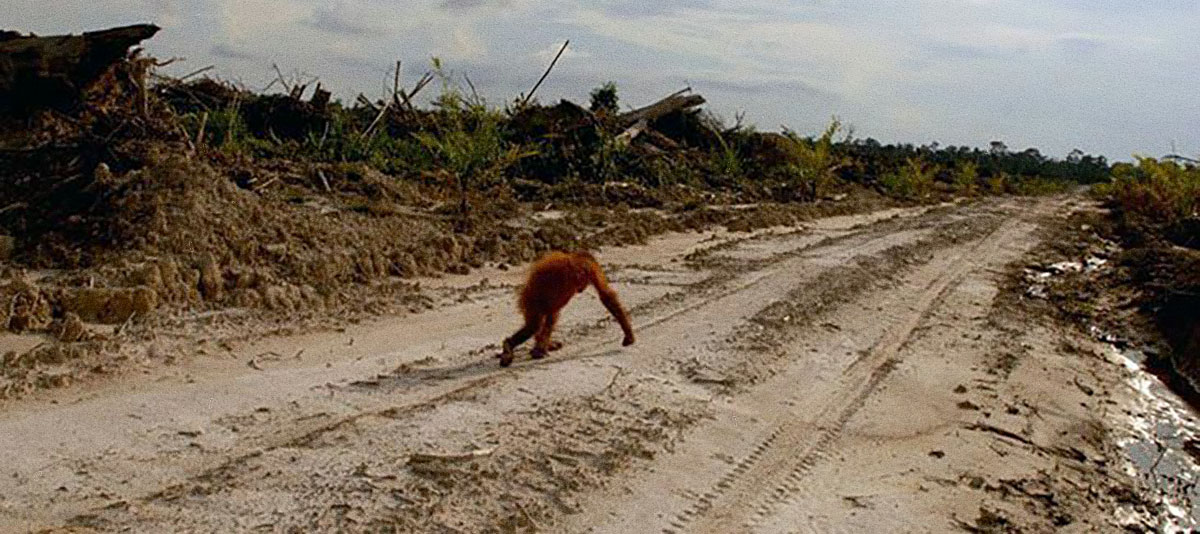
The Palm Oil Industry

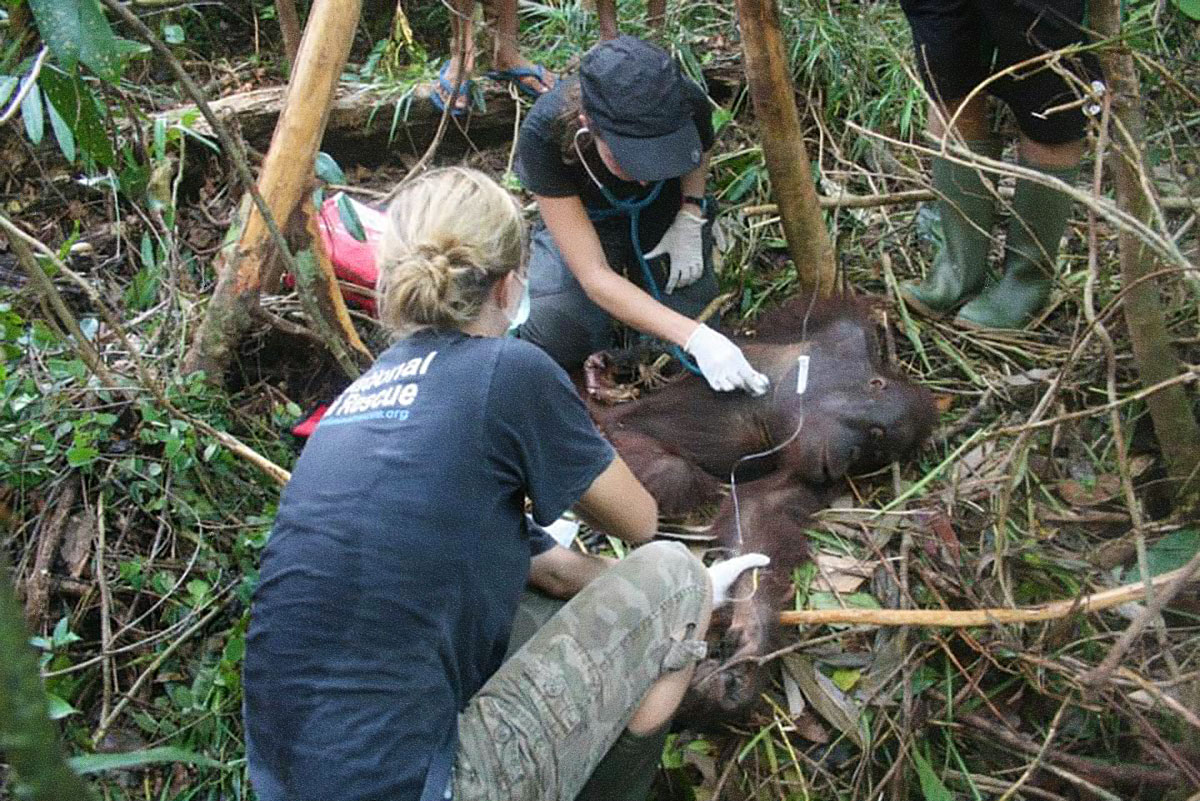
The main threat to the survival of orangutan populations in Borneo and Sumatra is the massive expansion of palm oil plantations on the two islands. Palm oil is the most widely used vegetable oil in the world. Half of all packaged foods found on supermarket shelves now contain palm oil. Palm oil is found in all types of baked goods, including cookies, bread, potato chips, and chocolate. It is used extensively in cosmetics and toiletries like soaps, creams, lotions, shampoos, and toothpaste because it adds creaminess and/or a foam-like quality to the product. Escalating global demand for palm oil has fueled the massive tropical forest destruction throughout the world’s tropical regions to make way for lucrative palm tree plantations. Indonesia and Malaysia have been affected most; together they account for 85% of the world’s palm oil production.
In 2007, the United Nations Environment Programme (UNEP) reported that palm oil plantations are the leading cause of rainforest destruction in Borneo and Sumatra. The University of Sheffield revealed that palm oil plantations have also accounted for the mass depletion of tropical mangrove forests, which contain fragile coastal marine ecosystems. The spread of palm oil plantations has been disastrous for orangutans and has severely impacted other endangered wildlife species like the Sumatran tiger and a variety of monkey species. The destruction of the forests has also created conflict with local communities over traditional land rights. Indigenous people have been evicted from their territories, leading to conflict with local governments and palm oil companies. It is not uncommon for local people in Borneo and Sumatra to be sent to jail for protesting the taking of their land.
In Sumatra, over 41,700 square miles of forest has been burned for palm oil plantations. In Borneo, a similar amount has been destroyed. Since the 1950s, about 70% of all Indonesian forest cover has been burned off. Because most of the forests are cleared through the use of fire, massive air pollution from smoke is common, contributing to global warming and further impacting the islands’ biodiversity. Indonesia is the third largest contributor of carbon to the earth’s atmosphere behind China and the United States. The clearing of Indonesia’s rainforest has reached an unprecedented critical stage. In November 2015, 120,000 active rainforest fires had been detected across the country, and on many days they were producing more carbon dioxide emissions than the total daily emissions in the U.S. The smoke was so bad it was visible from outer space.
After palm oil plantations are established, displaced starving orangutans often try to obtain food from the plantations and local farms. Considered “agricultural pests,” they are frequently killed by the plantation workers and farmers. Orangutan Foundation International estimates that in the last decade, the orangutan populations of Sumatra and Borneo have decreased by 50%.
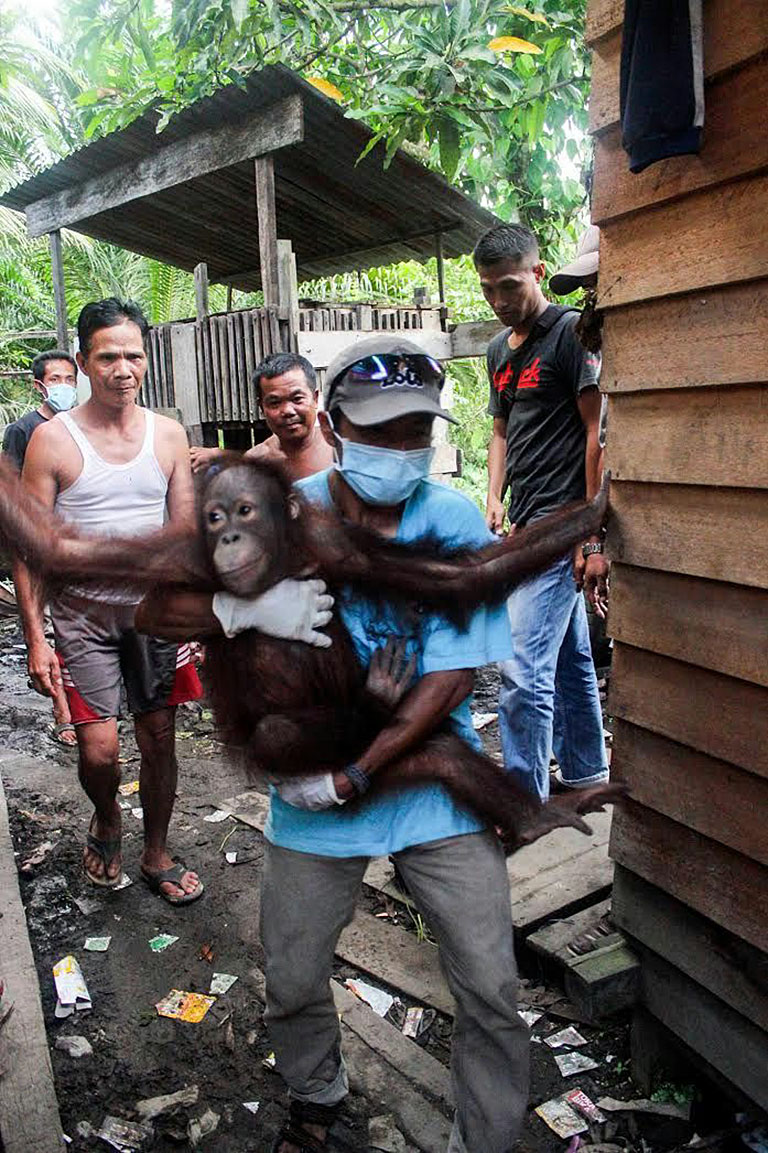
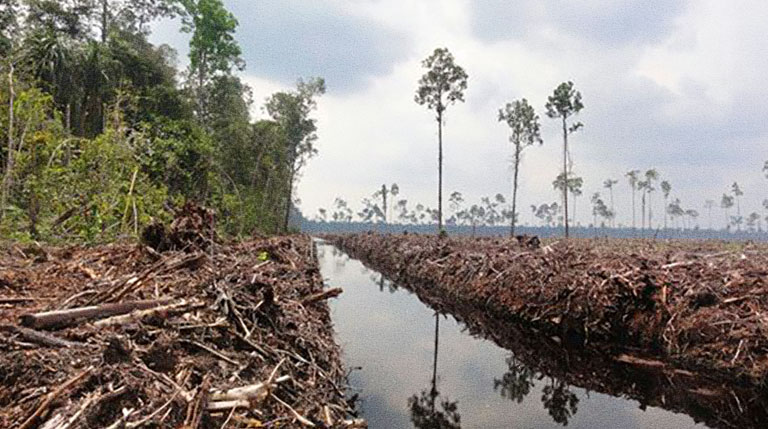
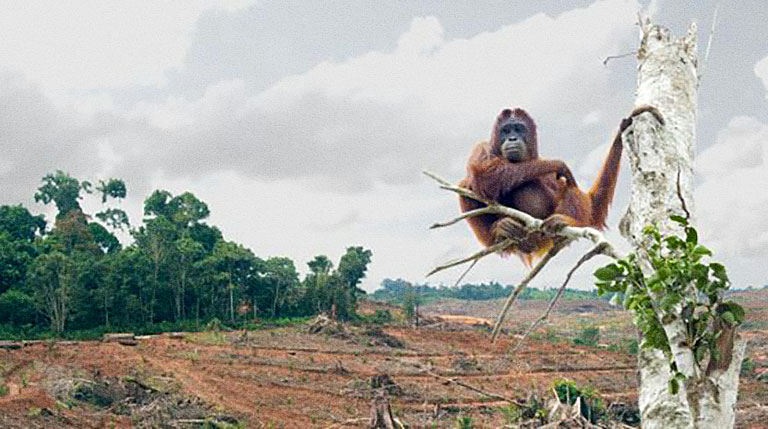
There’s an orangutan in my bedroom
’Green’

Green, a Sumatran female orangutan, is one of tens of thousand orangutans whose lives have been mercilessly extinguished as a result of deforestation. The last days of Green’s life were chronicled in the award-winning documentary Green, written and filmed by Patrick Rouxel.
The film shows Green’s lush Indonesian rain forest home in the weeks before the loggers and heavy machinery moved in. We see all the different types of wildlife that shared the forest with her, including Asian elephants, monkeys, bearded pigs, Sambar deer, lizards,and dragonflies. Unfortunately, like the majority of the Indonesian rain forest, the area of the forest where Green lived was intentionally burned down to provide land for a palm oil plantation. Green was unable to escape the destruction and was found near death partially buried in the mud and ash. She was packed in a dufflebag and driven in the back of a pickup truck to a clinic, but it was too late to save her. She died a few days later on a small bed in a corner.
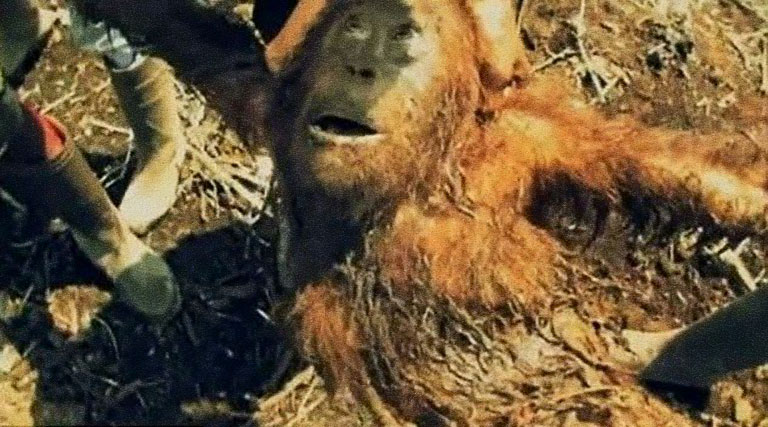
Green is one of tens of thousand orangutans whose lives have been mercilessly extinguished as a result of deforestation
Green has won over 35 international film awards and has inspired thousands of viewers to analyze the role they play in the destruction of rainforest habitat as consumers of products derived from Indonesian palm oil, paper, and wood products. Amazingly, there is no human dialogue throughout the film. Instead, the images and sounds of the rainforest, its animals, and their destruction tell the story.
The Logging Industry

In addition to palm oil companies clearing the forests for plantations, timber companies often illegally log in the forests, further reducing the orangutan population. Research has indicated that in the last 25 years, 70% of timber processed in Indonesia has come from illegal sources. Illegal logging generally focuses on specific, valuable tree species used in furniture making and construction. These are often large, old seed-bearing trees. The loss of these large trees contributes to the further degradation of the forests’ structure, habitat, and food source elements and makes it all the more difficult for orangutans to find food.
Logging (both legal and illegal) damages the forests in ways beyond the loss of trees. The loggers create canals and large trails to allow foot and boat access deep into the forest. Canals result in lower water levels in local streams and rivers, as well as increased water pollution. The large logging trails enable human access to the forests, which in turn invites illegal hunters who further damage the local ecosystem and wildlife populations.
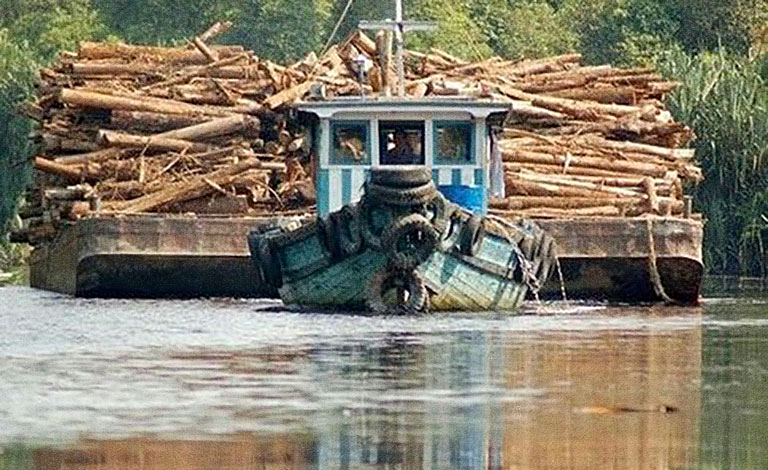
Illegal Pet Trade

The illegal orangutan pet trade has also been responsible for the decline of the orangutan species. Although prohibited by law in most of the world, baby orangutans are still captured and sold as pets. In Taiwan during the early 1990’s, thousands of baby orangutans were imported and sold because of a popular children’s TV show featuring a young orangutan, and it’s still popular to keep them as pets in other parts of Asia today.
When a mother orangutan is killed at a farm or plantation trying to obtain food, the baby orangutan is often sold to poachers, who then sell the baby into the pet trade. Recent enforcement of the law in Taiwan has reduced the importation of orangutans there, but the trade remains a threat.
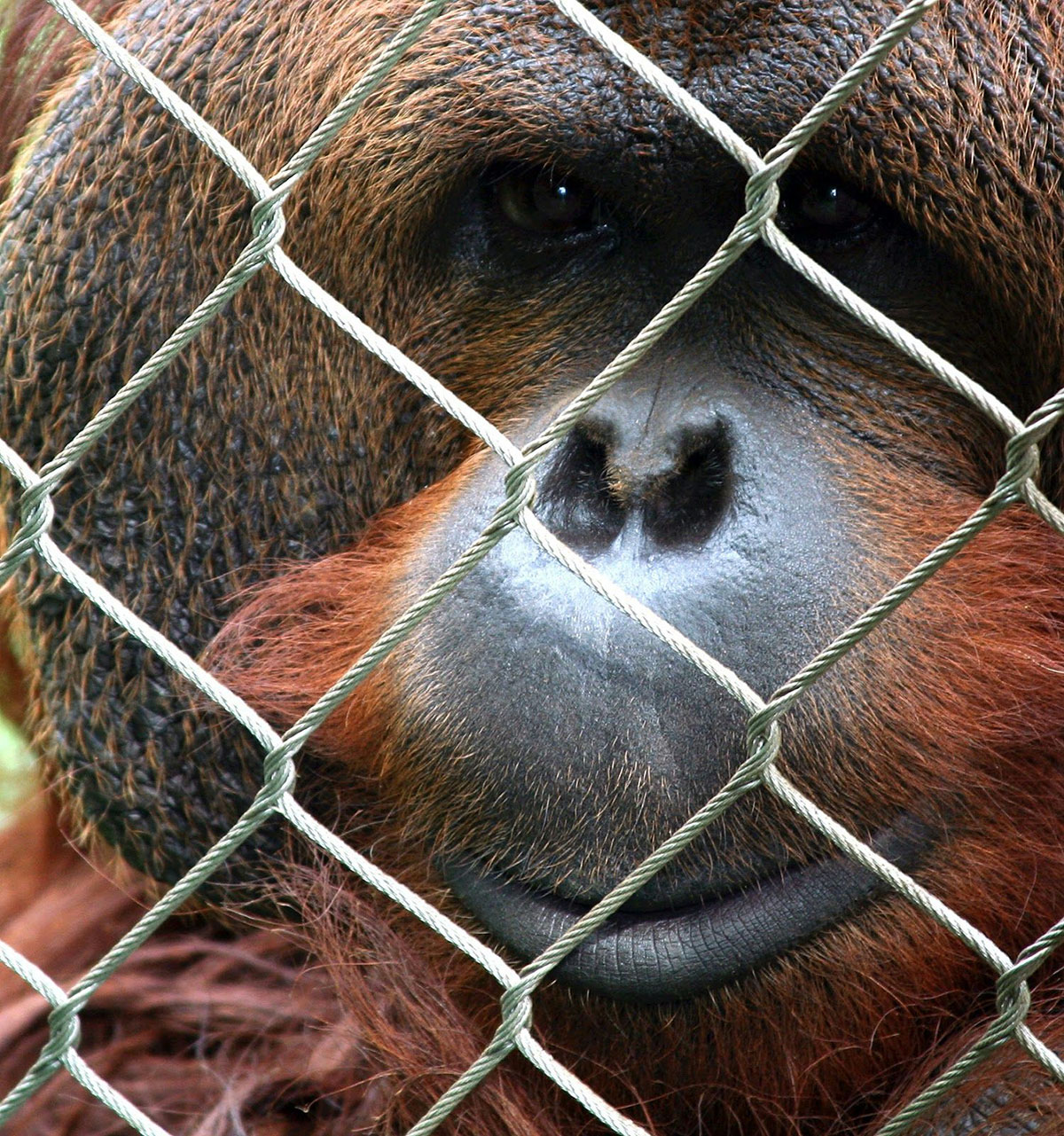

Positive Change
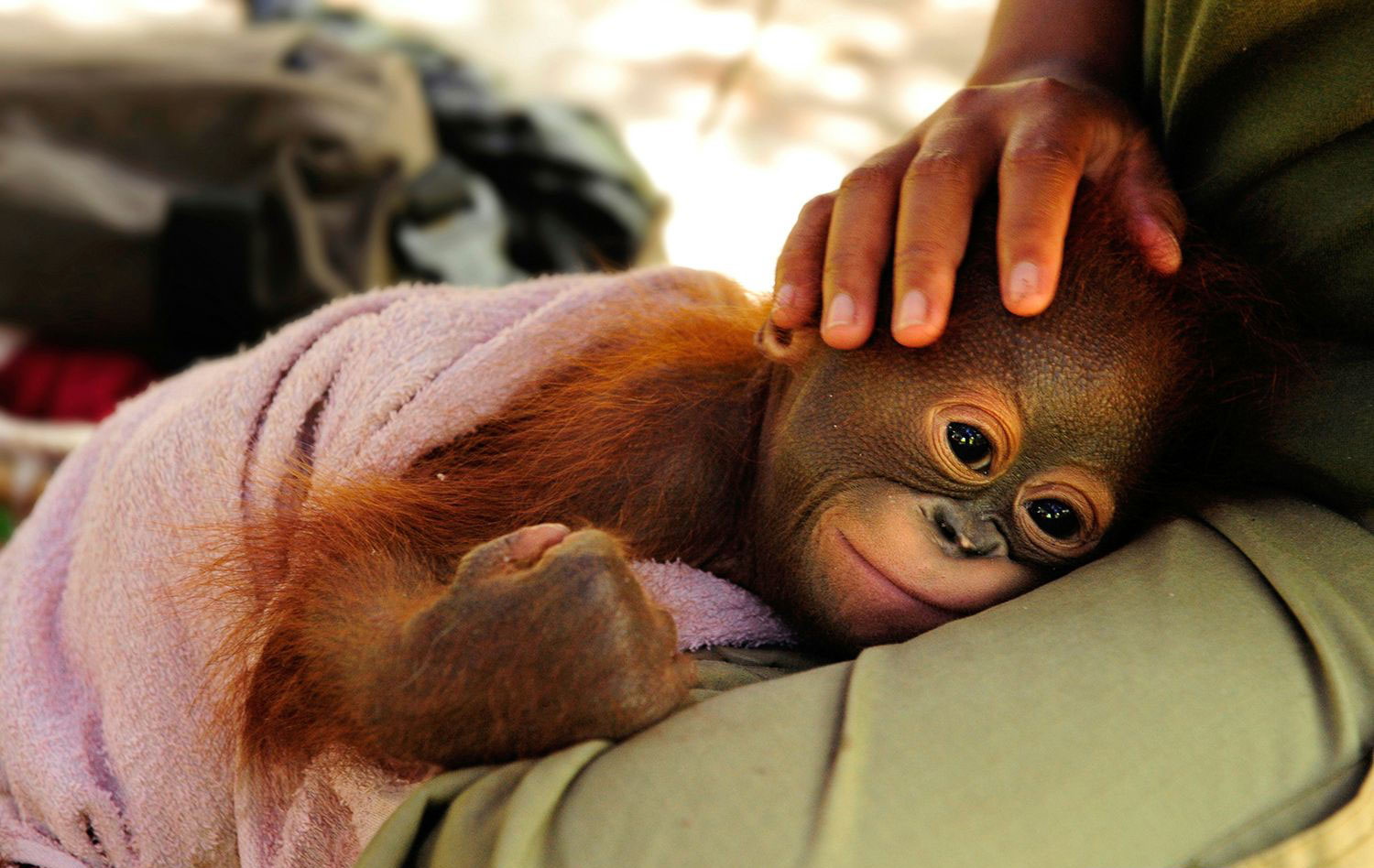
Orangutan babies solely rely on their mothers for milk, warmth and love, staying close to their mothers for as long as eight years. But the orangutan orphans at the Borneo Orangutan Survival Foundation (BOSF) Nyaru Menteng Sanctuary, an orangutan rehabilitation and reintroduction center in Kalimantan, Borneo, rely on human surrogate mothers to take care of them 24/7.
The decimation of the orangutan population over the last two decades has been devastating. In the last ten years alone, conservation organizations have determined that the orangutan population on Sumatra and Borneo has dropped by approximately 50%. This decrease is a direct result of human activity, mainly from the unregulated destruction of the orangutan’s habitat, the Sumatran and Bornean rainforests. It is no exaggeration to say that, unless a halt to rainforest destruction in Sumatra and Borneo occurs very soon, wild orangutans could be extinct within the next 20 years. Despite this sobering reality, however, some positive steps have taken place recently, offering a glimmer of hope that, with our help, orangutans can make a comeback.
It is no exaggeration to say that, unless a halt to rainforest destruction in Sumatra and Borneo occurs very soon, wild orangutans could be extinct within the next 20 years
Consumer Awareness of Palm Oil Plantations and Rainforest Destruction

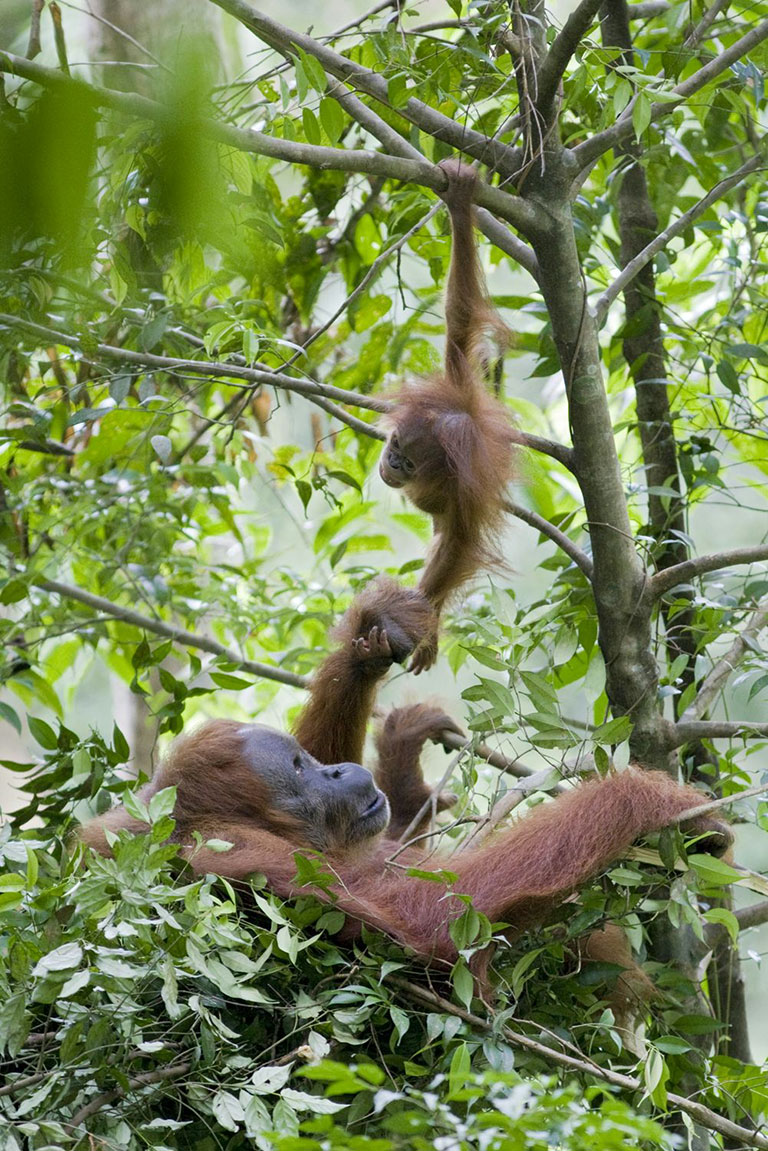
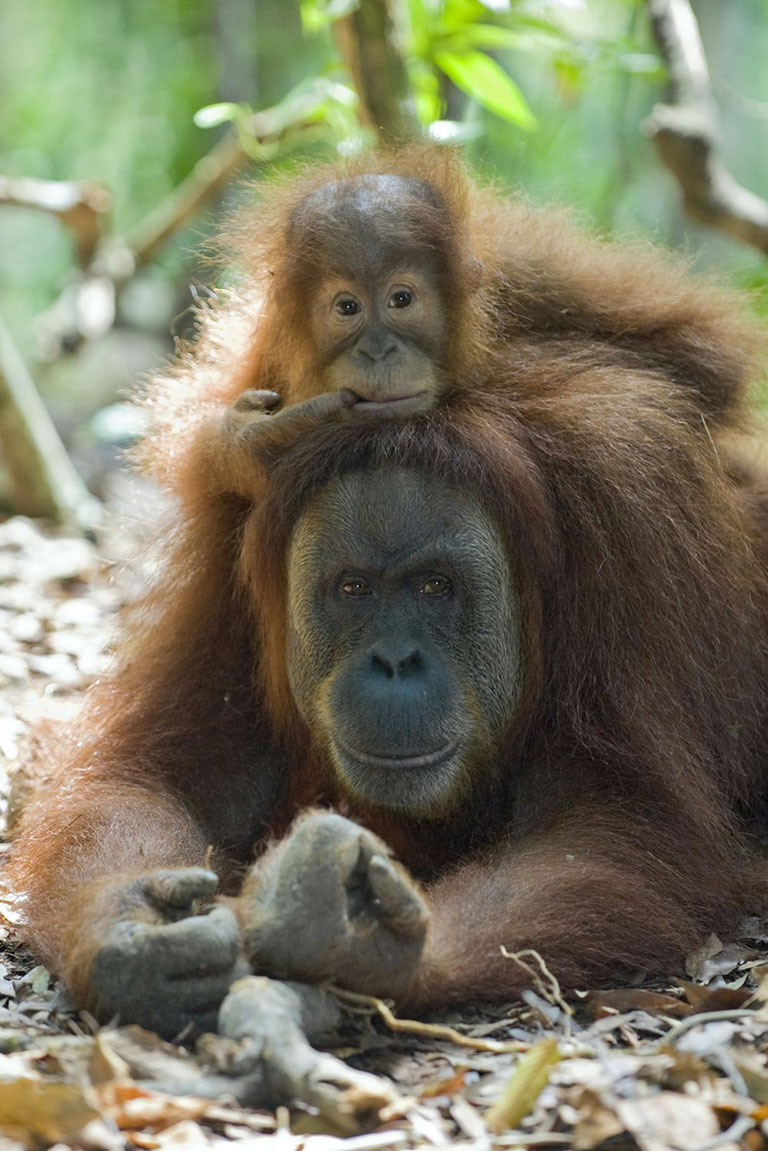
Through the educational outreach programs of orangutan advocacy and environmental awareness organizations, people around the world are beginning to see how the destruction of the Indonesian and Malaysian rainforests is decimating the orangutan population and other endangered species, including the Sumatran tiger and numerous primate species. Consumers are coming to understand that when they purchase food and cosmetic products made from palm oil, they are directly impacting the lives of orangutans and other vulnerable animal species in Borneo and Sumatra. In the last ten years, International Animal Rescue, Borneo Orangutan Survival Australia, Orangutan Foundation UK, Palm Oil Investigations, Greenpeace, WWF, Palm Oil Consumer Action, Deforestation Education, and other advocacy groups have successfully educated millions of people concerning the plight of the orangutan and the destruction of their rainforest habitat by the palm oil industry.
Groups of concerned consumers tens of thousands of miles away from Borneo and Sumatra are speaking up on the behalf of orangutans and asking food and cosmetic manufacturers to stop using palm oil produced from rainforest plantations
Groups of concerned consumers tens of thousands of miles away from Borneo and Sumatra are speaking up on the behalf of orangutans and asking food and cosmetic manufacturers to stop using palm oil produced from rainforest plantations. Some of these groups are demanding palm oil from sustainable sources only, while others are advocating for a complete end to the use of palm oil altogether. In 2010, global manufacturing giant Nestle discontinued the use of palm oil derived from rainforest plantations in their products. This was a direct result of a worldwide Greenpeace campaign. Four years later, in 2014, Kellogg’s responded to intense pressure from Greenpeace and other environmental/consumer advocacy groups and agreed to purchase palm oil only from suppliers who can prove that they actively protect rainforests and respect human rights of the indigenous rainforest people. And in 2015, in response to a global campaign, popular brand Nutella announced that it has switched to 100% certified sustainable palm oil, which can all be traced back to the source. This ensures that it will not come from areas that have been recently deforested. Furthermore, orangutan habitat will not be threatened, as Nutella will no longer source any of their palm oil from Indonesia.
The call to action hasn’t only come from large global organizations. In 2014, a group of teens from the Boulder, Colorado area formed the Saving Orangutans Society. The group actively educates citizens throughout Colorado about orangutan habitat loss and has written hundreds of letters to an ice cream manufacturer in Iowa, asking it to discontinue the use of rainforest-derived palm oil in their ice cream. Saving Orangutans Society has received substantial media attention and has inspired other student groups throughout the US to stand up for orangutans and rainforest protection.
Since 2013, more than a million people around the world have signed petitions calling on the Governor of the Aceh province in Sumatra to abandon a law that will allow palm oil corporations and mining companies to cut down the last remaining rainforest in Sumatra, in the irreplaceable Leuser Ecosystem. The Leuser Ecosystem rainforest is the last stronghold for Sumatran orangutans, tigers, elephants and rhinos. In June 2014, Walhi Aceh, an Indonesian human rights and environmental advocacy organization, registered a legal case to challenge the law. After the Walhi Aceh suit was filed, a large European Union (EU) delegation met with the Aceh Governor to discuss the environmental significance of the Leuser Ecosystem and the need for its legally protected status to be enforced. The EU Ambassador to Indonesia, Mr Olof Skoog, stressed “the global importance of the Leuser Ecosystem for biodiversity” and Dr. Ian Singleton from the Sumatran Orangutan Conservation Programme said, “It is no exaggeration to state that the survival of elephants, rhinos, tigers and orangutans in the Aceh [region of Sumatra] depend on decisions being taken here.”
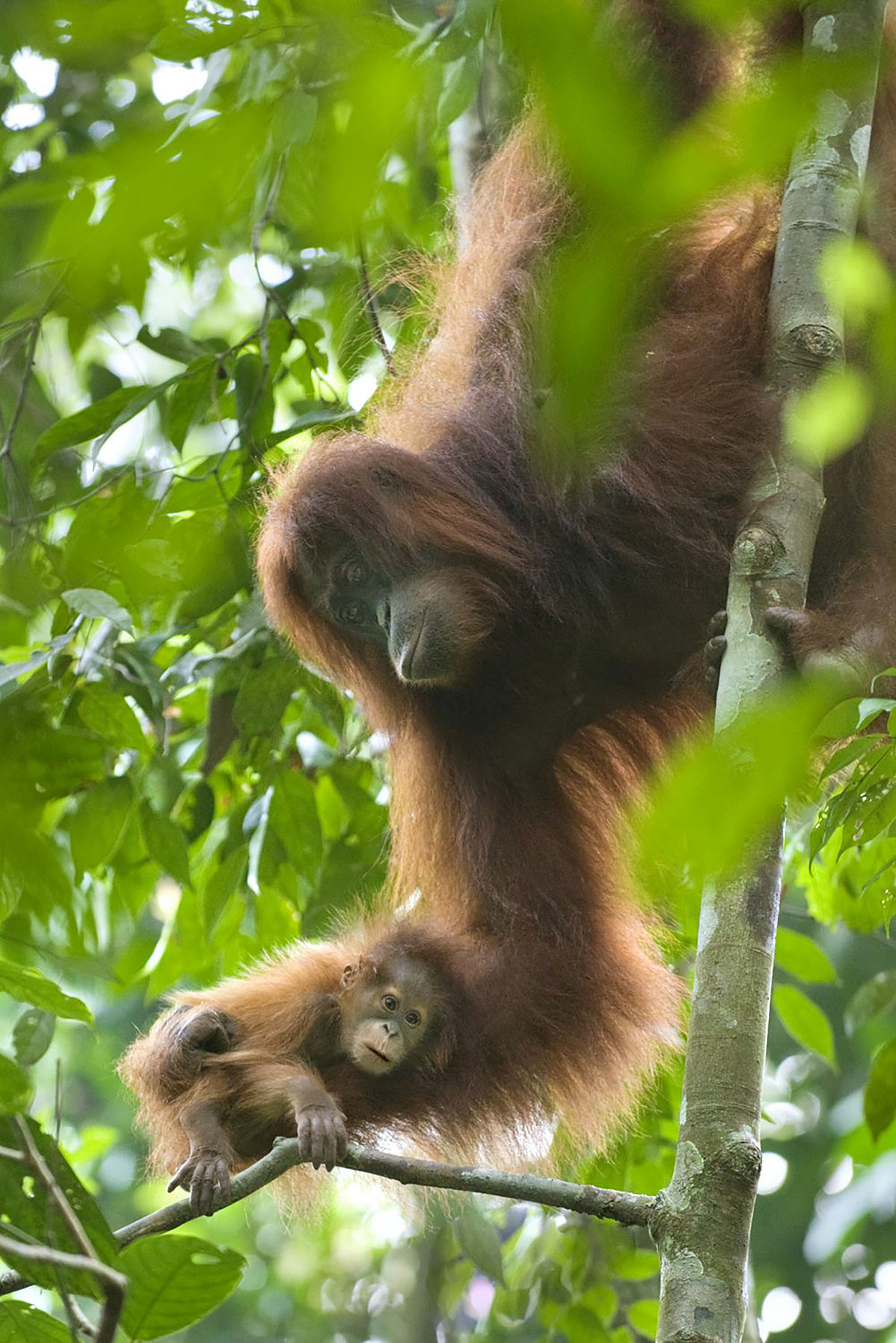
Orangutan Sanctuaries

In the last 15 years, numerous orangutan sanctuaries have been established in Sumatra and Borneo. These sanctuaries offer medical treatment to help heal and rehabilitate injured orangutans and prepare them for reintroduction back into the wild. They provide a loving, permanent home for orangutans that are no longer capable of living in the wild. These sanctuaries also serve as educational centers that advocate a halt to deforestation and the decimation of orangutans and other endangered species.
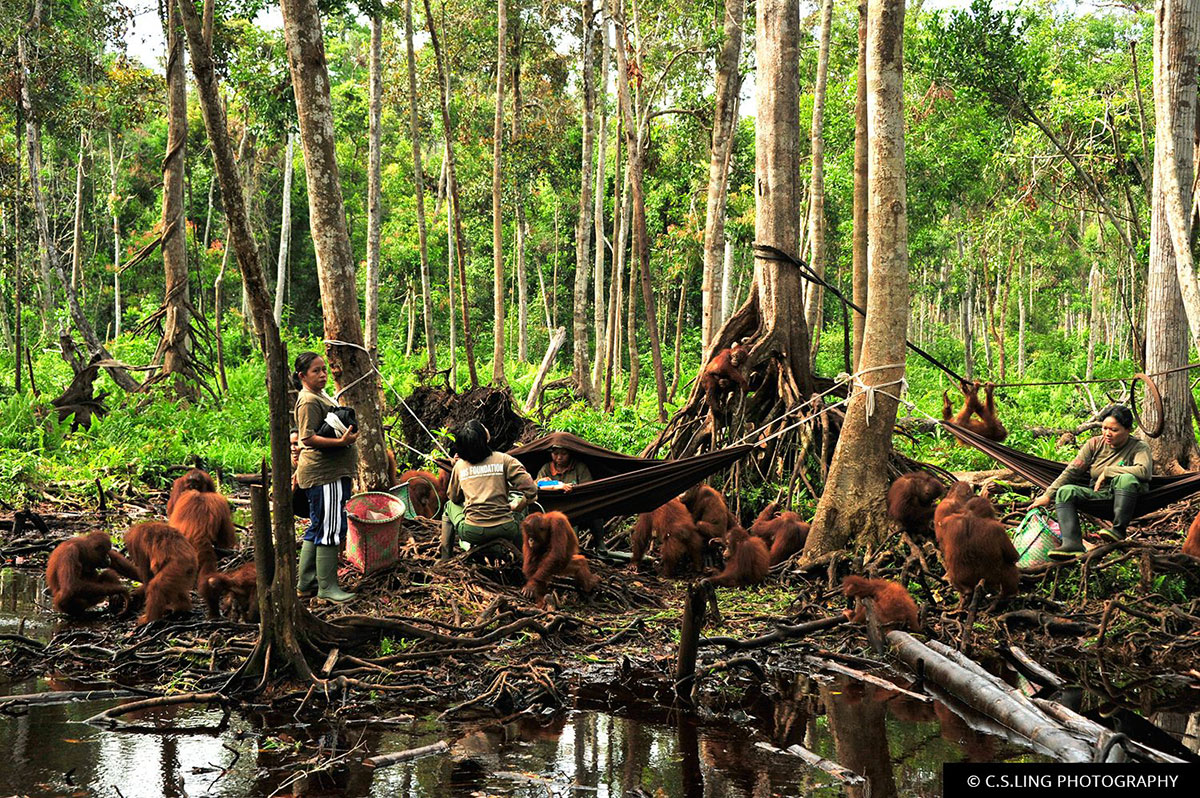
More than 600 orangutan orphans were rescued from illegal pet traders and taken to the BOSF Nyaru Menteng Sanctuary. When the young orangutans are about three years old, they go to “Forest School” to master the important skills of tree-climbing, food foraging and nest-building, in the hope that they will return to the wild in the future.
- Borneo Orangutan Survival Foundation Samboja Lestari Sanctuary
East Kalimantan, Borneo. Currently cares for over 200 orangutans. - Borneo Orangutan Survival Foundation Nyaru Menteng Sanctuary
Central Kalimantan, Borneo. Currently cares for approximately 650 orangutans. - International Animal Rescue Ketapang Sanctuary
Western Kalimantan, Borneo. Currently cares for over 100 orangutans. - Orangutan Foundation International Care Center Quarantine
Central Kalimantan, Borneo. Currently cares for approximately 330 orangutan orphans. - Orangutan Foundation International Camp Kerantungan Refuge Release Site
Central Kalimantan, Borneo. Over 20 orangutans have been rehabilitated and released back into the wild. - Orangutan Foundation International Camp Seleng Mas Refuge Release Site
Central Kalimantan, Borneo. Thirty-four orangutans have been rehabilitated and released back into the wild. - Orangutan Foundation International Camp Leakey
Central Kalimantan, Borneo. Research and observational site for caring for released orangutans in Tanjung Puting National Park.
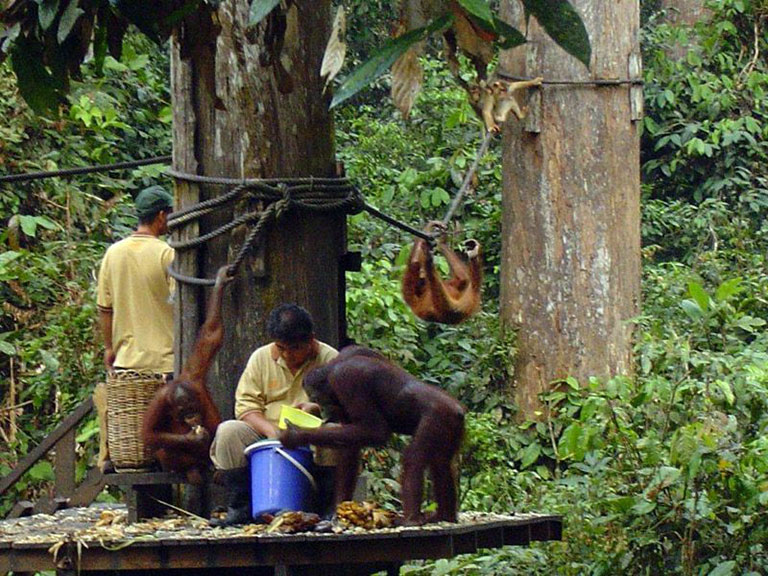
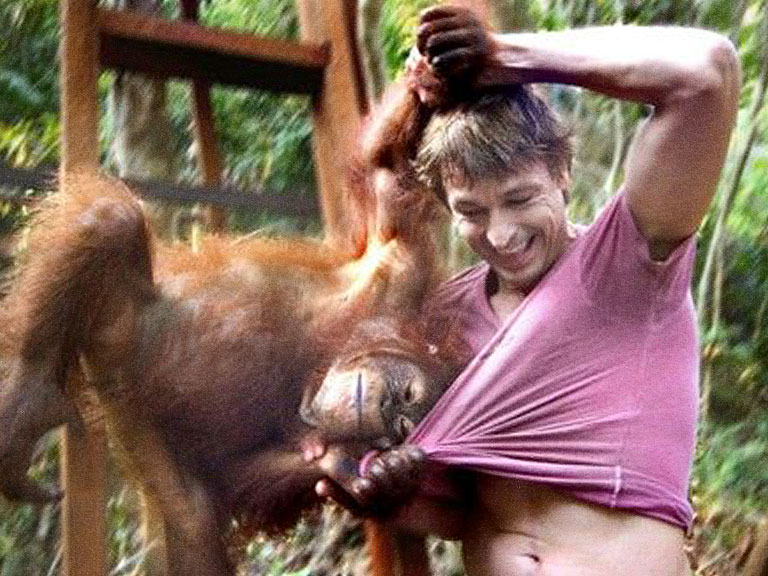
Orangutan Advocacy Organizations

Numerous global and national orangutan advocacy groups have worked tirelessly at educating the world about the plight of orangutans in Borneo and Sumatra. Organizations like International Animal Rescue, Orangutan Information Centre, Sumatran Orangutan Society, Borneo Orangutan Survival Foundation, Greenpeace, Orangutan Foundation International, Sumatran Orangutan Conservation Programme, Orangutan Outreach and other groups educate the public as well as lobby food/cosmetic companies and national/regional governments on the behalf of orangutans and other at-risk rainforest animals.
It was through the outreach efforts of one of these organizations that many orangutan advocates first learned about the dire circumstances facing orangutans in Borneo and Sumatra. The impact these groups have had in slowing the destruction of the Sumatran and Bornean rainforest and the extinction of orangutans cannot be overstated.
Surrogate mothers work on a daily rotational shift basis to prevent the orphans from becoming emotionally attached to them. The objective is to release them back into the wild one day
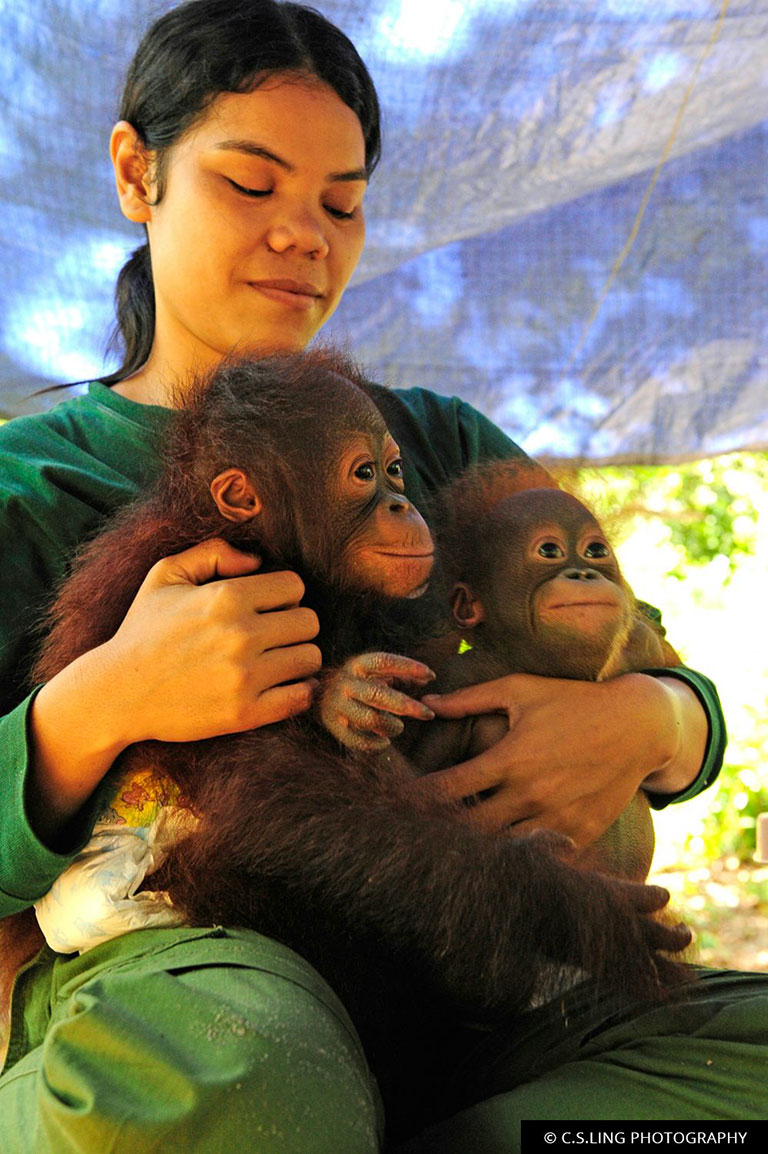
The Future of Orangutans

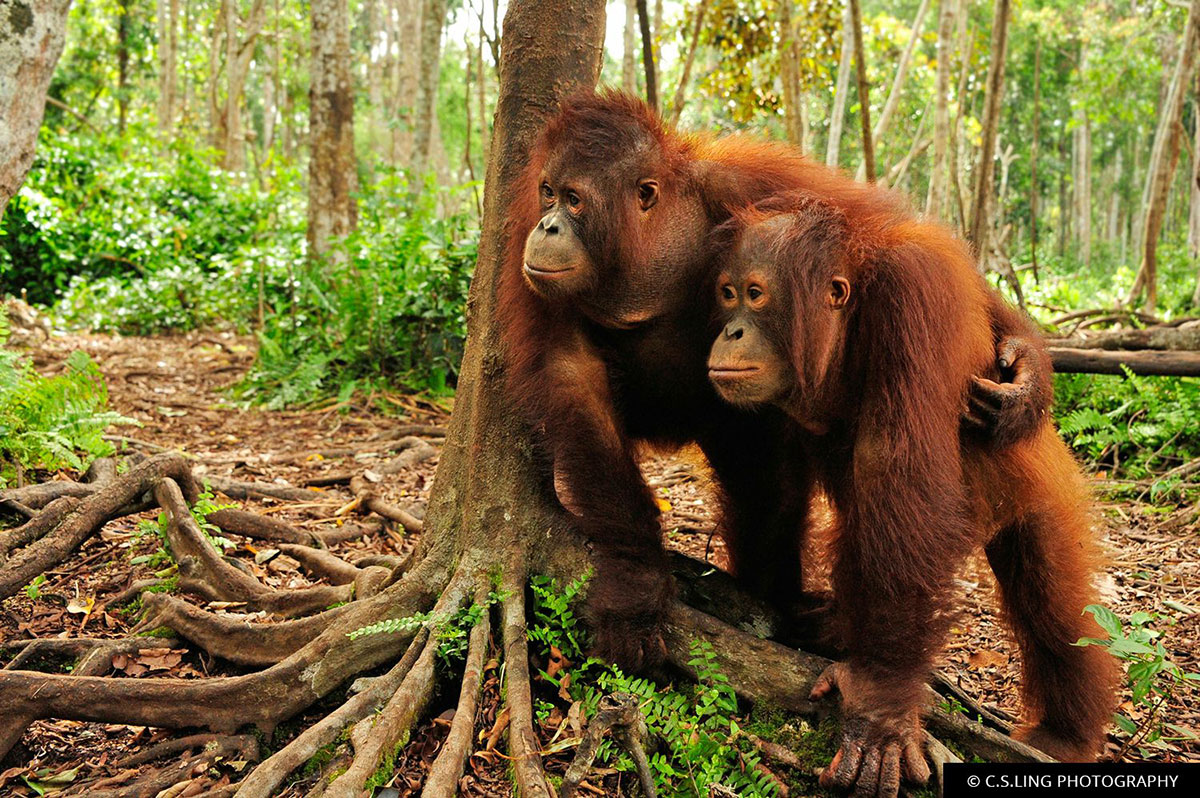
Panda and Claire are a loving couple; they are always together, Panda holding on to Claire, never letting go
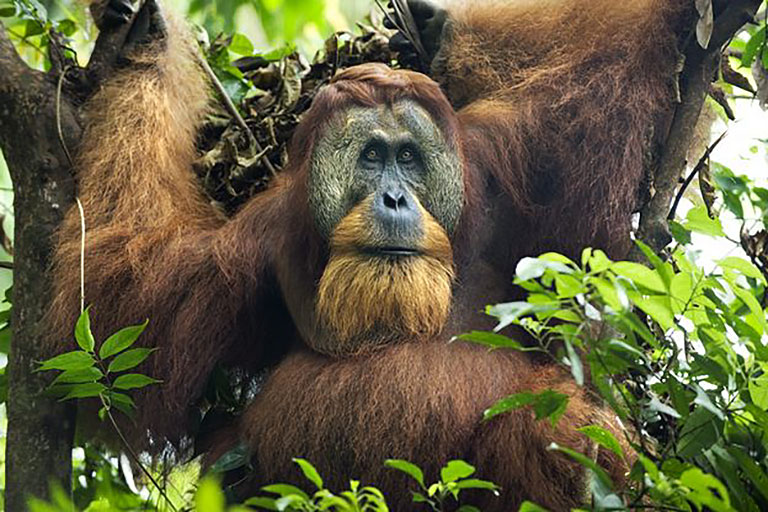
In December 2014, Argentina became the first country in the world to recognize a non-human primate as having legal rights when an Argentinian court ruled that an orangutan named Sandra at the Buenos Aires Zoo must be moved to a sanctuary in Brazil in order to provide her with “partial or controlled freedom”. This judgement was a massive symbolic step forward in recognizing orangutans as intelligent, sensitive animals worthy of legal rights. However, the Indonesian and Malaysian governments have not yet reached the same conclusion. Orangutan and animal rights organizations must keep the pressure on the Indonesian and Malaysian governments to stop the destruction of the Sumatran and Bornean rainforests. Palm oil, paper pulp, and mining corporations must be held accountable for their actions. Otherwise, orangutans will soon be nothing but a memory.
In December 2014, Argentina became the first country in the world to recognize a non-human primate as having legal rights

Action
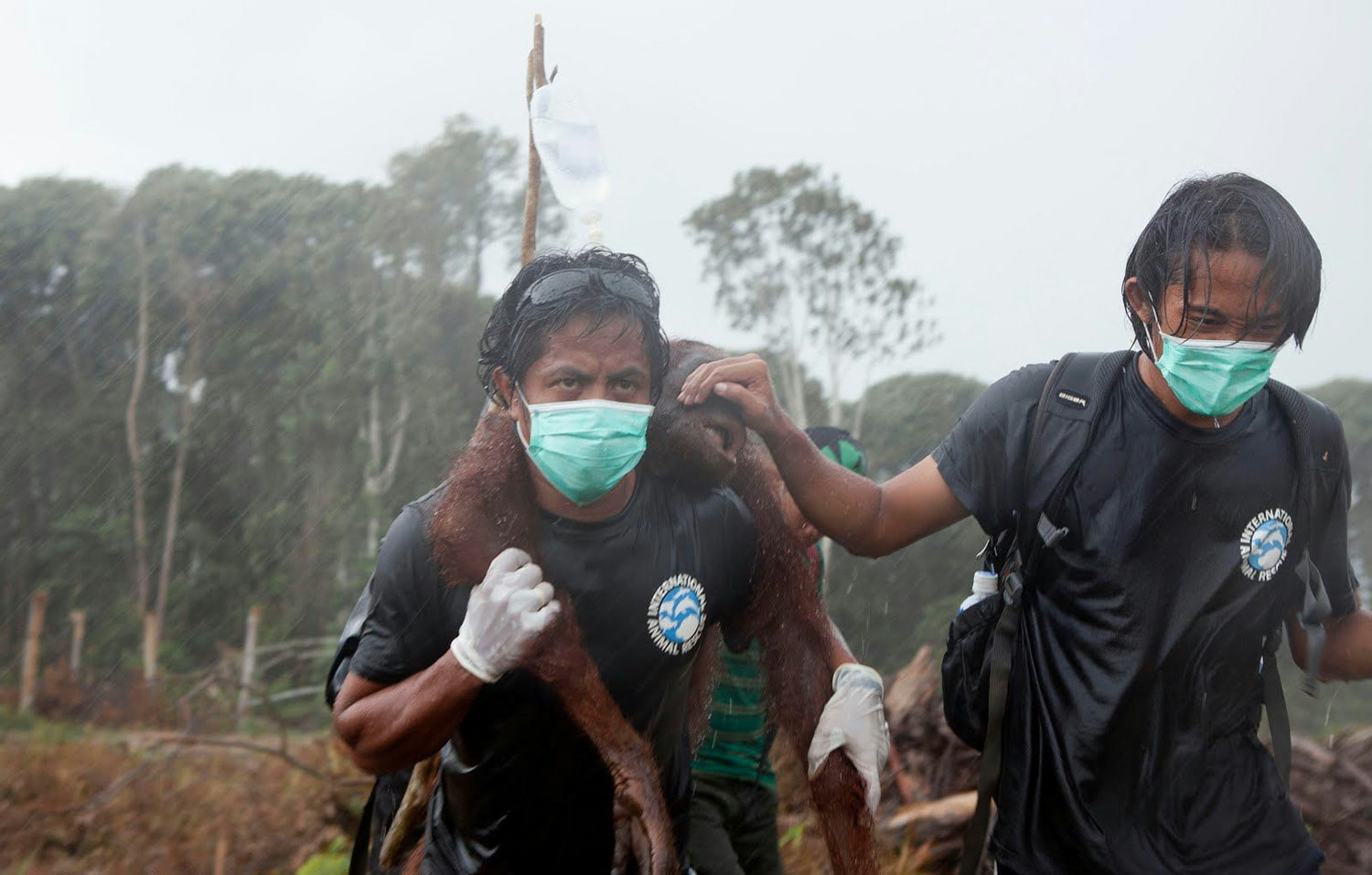
Despite the alarming speed with which Bornean and Sumatran rainforest is being destroyed, a very vocal and organized effort is currently underway to halt the destruction. Please stand up and take action before it is too late and orangutans become a thing of the past. When you speak out on behalf of these extraordinary creatures, you become an integral part of the movement to protect orangutans, their homes, and their future. Here are some ways you can help bring about change.
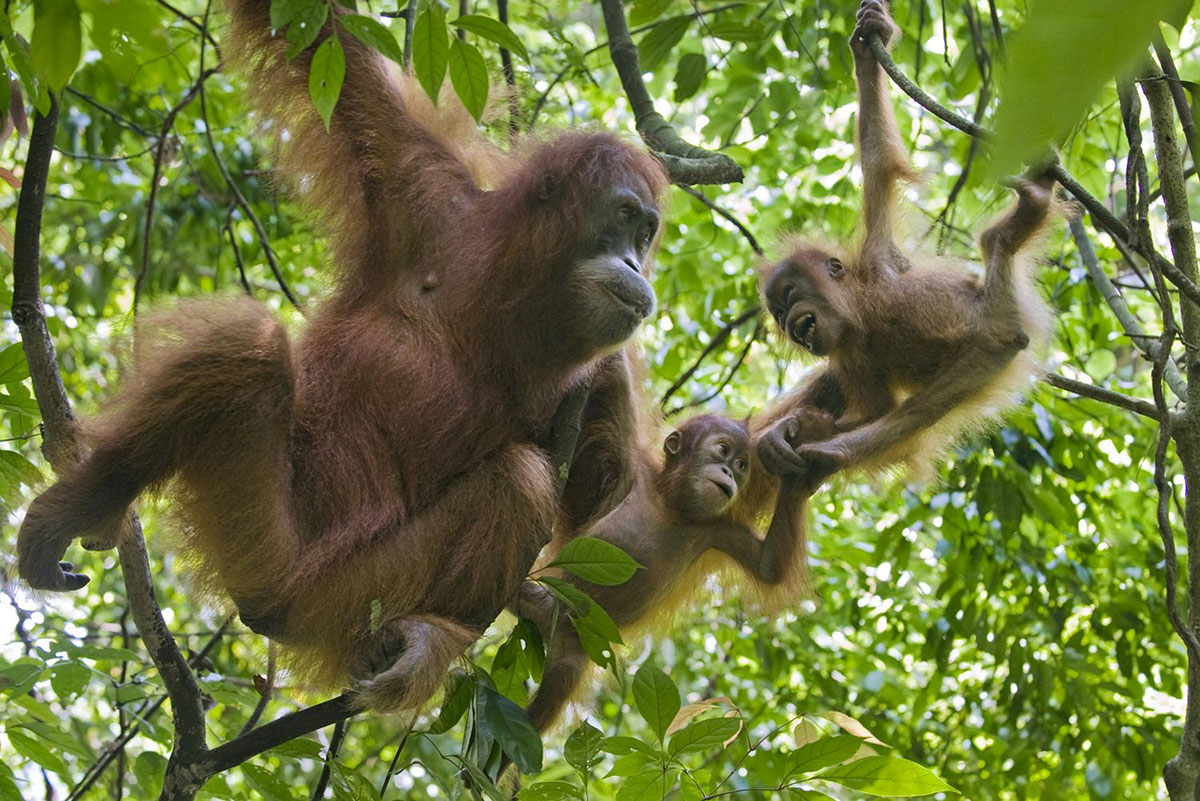
Do not purchase food and cosmetic products that contain palm oil

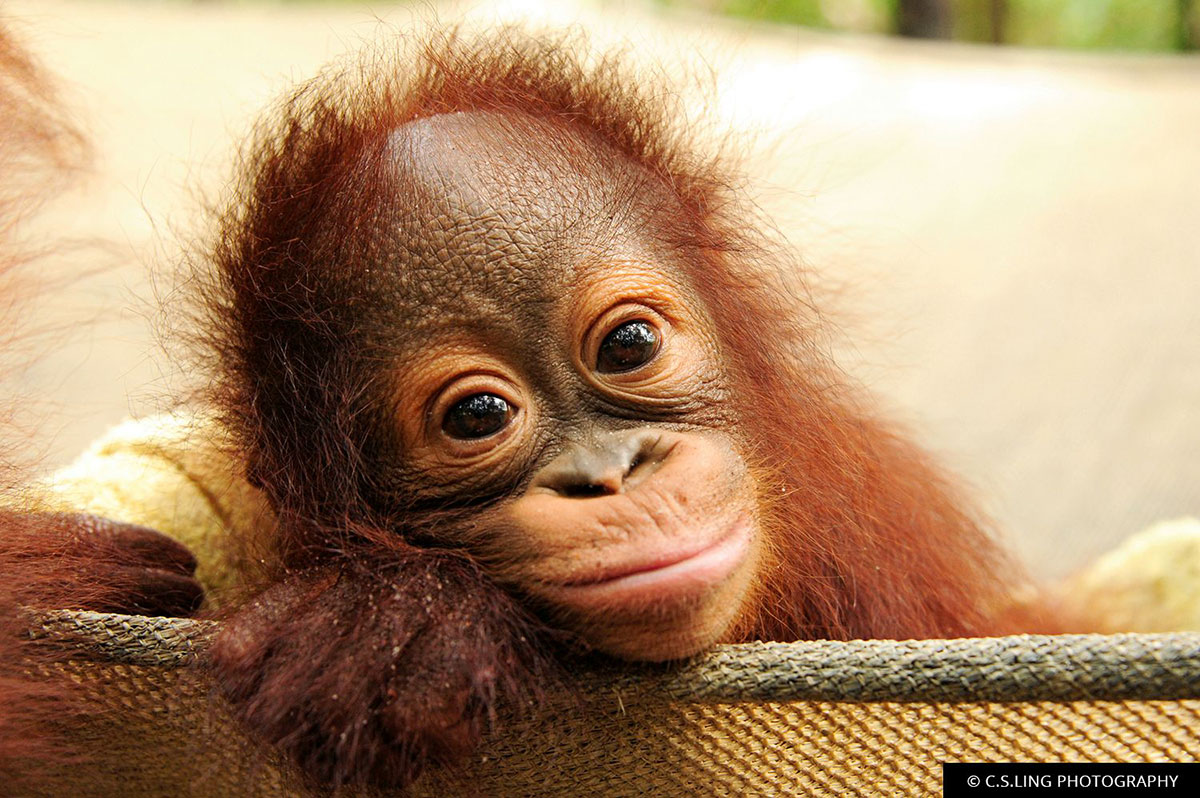
Mikko was the second youngest orangutan at BOSF Nyaru Menteng Sanctuary when he arrived in February 2010 after being confiscated from a nearby village. He’s bright and healthy; he likes to play and make friends with everyone
Much of the palm oil imported into the U.S. ends up in snack foods, such as cookies, crackers, chips, candy and microwave popcorn. It is estimated that palm oil is in about half of all packaged goods in American supermarkets. Food standards in the United States and many other countries allow palm oil to be included on the ingredient list as simply “vegetable oil”. Palm oil can be even less visible as part of the minor components of a food product — colourings, flavourings and emulsifiers. One quick quick rule of thumb: if the saturated fat content of a food product is around 50%, the likelihood of the vegetable oil being palm oil is high.
Food standards in the United States and many other countries allow palm oil to be included on the ingredient list as simply “vegetable oil”
In cosmetics, palm oil is labelled “Elaeis guineensis”, but, as with the food industry, its presence is often less obvious. Any ingredient which includes the word “palm” (palmitate, palmitoyl or simply palm) will include palm oil. Other ingredients that commonly (but not always) use palm oil include cetyl alcohol, isopropyl, sodium lauryl sulphate, fatty alcohol sulphates, glycerine, cocoa butter equivalent and cocoa butter substitute.
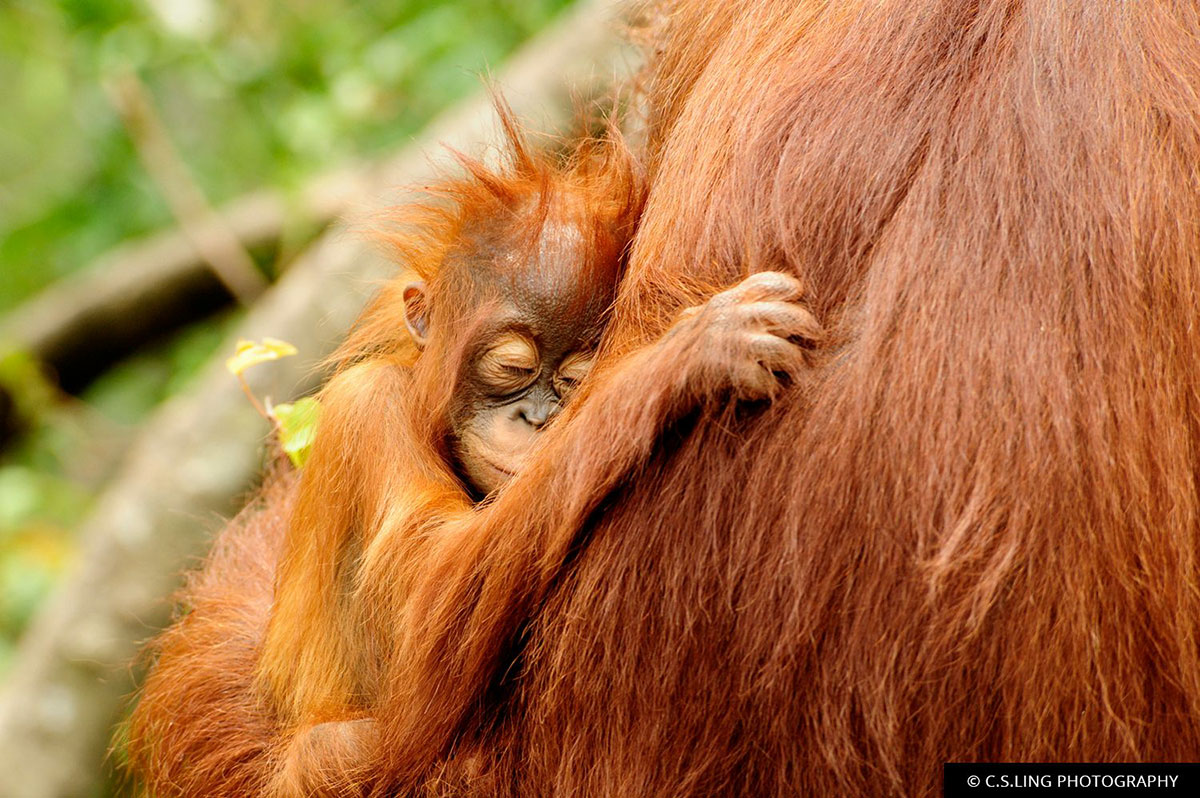
After Nursery and Forest School, successful ‘graduates’ at BOSF Nyaru Menteng Sanctuary are carefully selected for release onto the semi-wild Orangutan Island, which is undisturbed by humans. In one success story, this female orangutan orphan grew up and successfully raised her own baby in the wild
The Facebook Reference Page: PALM OIL-Products on American Shelves that Contain Palm Oil is an absolutely fantastic reference for American consumers. It lists products on American shelves that both contain and do not contain palm oil. The Borneo Orangutan Survival Australia website is another great source, containing an exhaustive list of Australian products that do not contain palm oil.
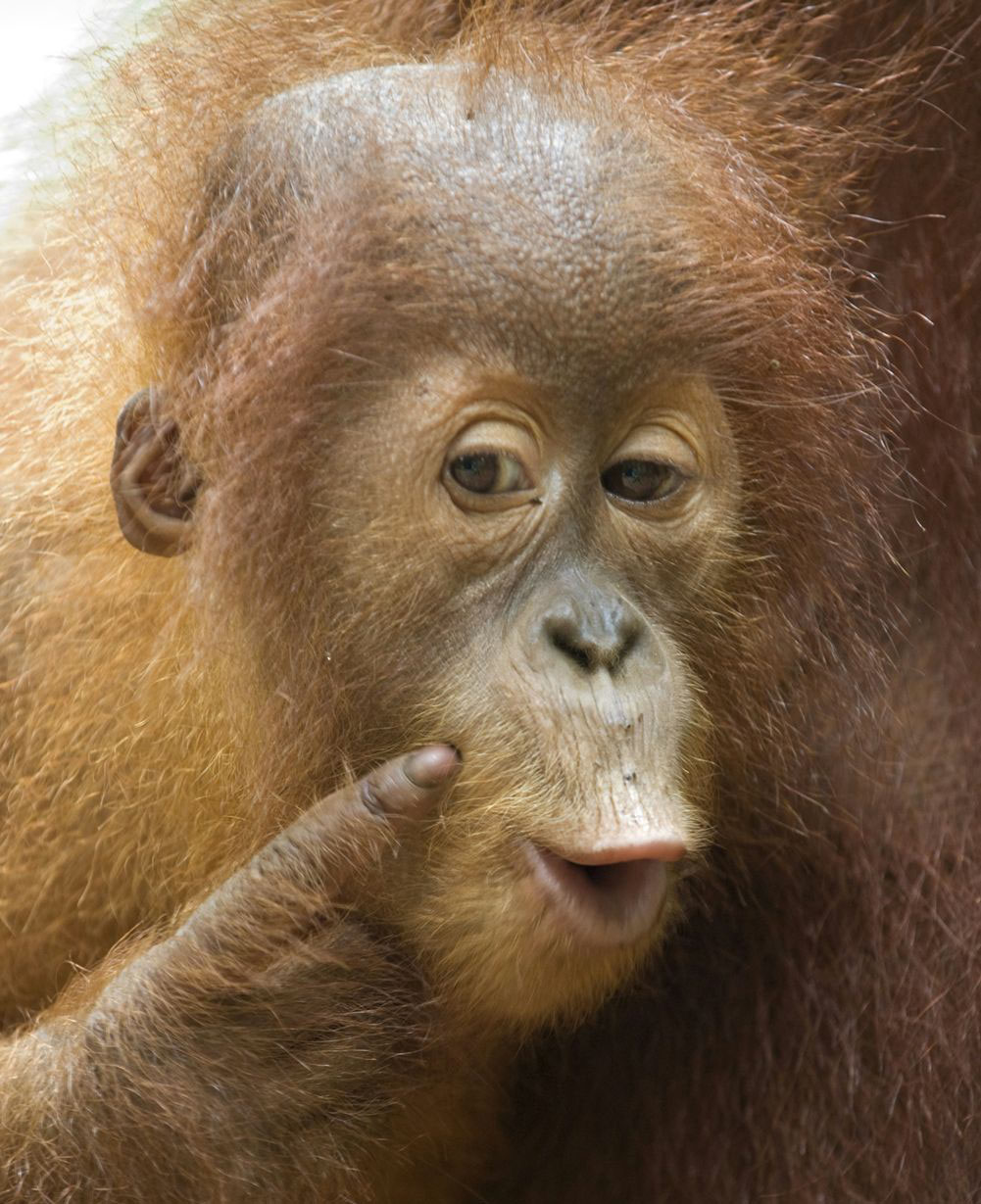
Generally speaking, when purchasing the following products beware that most brands contain palm oil.
Baby food
Biscuits and biscuit mix
Breakfast cereals
Cake mix
Canned soups
Candy and chocolate bars
Cereal bars
Chocolate
Cookies
Cookie mixes
Dishwashing soap
Hand soaps
Instant coffee mixes
Laundry detergent
Pancake and waffle mix
Peanut butter
Shampoo
Tortilla chips
Support orangutan sanctuaries and orangutan/rainforest advocacy organizations

International Animal Rescue Orangutan Rescue and Rehabilitation Centre
The International Animal Rescue (IAR) Orangutan Rescue and Rehabilitation Centre is located in the Bornean region of western Kalimantan, an area that has been devastated by widespread deforestation. Over the past ten years, countless orangutans have been slaughtered in this neglected Indonesian province as the rainforest was destroyed by timber and oil palm companies. IAR began their rescue efforts here in 2009 and within two years, through the generous financial donations of their supporters, had purchased 163 acres. The Orangutan Rescue and Rehabilitation Centre was built from the ground up and completed in 2013. The centre accommodates up to 100 orangutans at a time, and facilities include large quarantine pens for new arrivals, a fully-equipped veterinary clinic, a public education centre, indoor facilities for adults and babies and a spacious outdoor “forest school” where the orangutans develop the skills and natural behaviour they need for reintroduction to the wild. To adopt an orangutan at the IAR Orangutan Rescue and Rehabilitation Centre or support IAR’s campaigns in Western Kalimantan, click here.
The centre accommodates up to 100 orangutans at a time,facilities include large quarantine pens for new arrivals, a fully-equipped veterinary clinic, a public education centre, indoor facilities for adults and babies and a spacious outdoor “forest school”
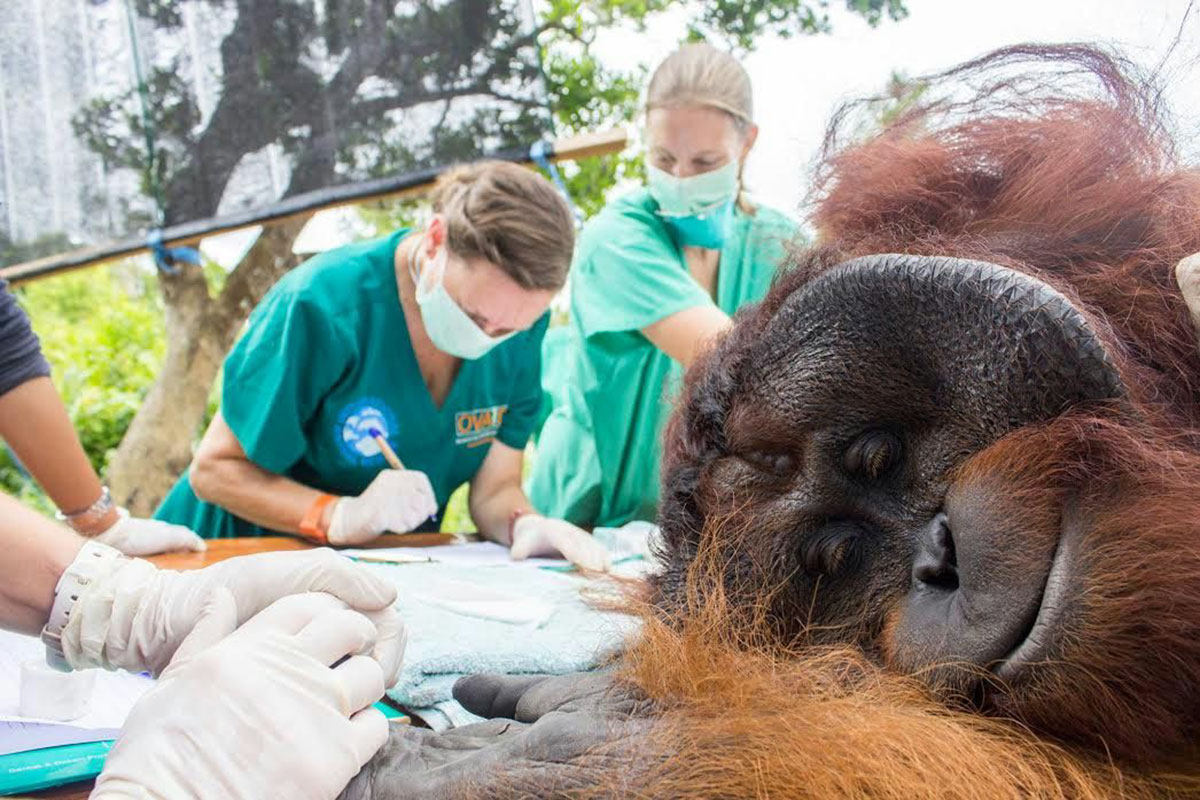
Sumatran Orangutan Society/Orangutan Information Center
The Sumatran Orangutan Society/Orangutan Information Centre (SOS/OIC) is at the forefront of saving the critically endangered orangutan population on the island of Sumatra. SOS/OIC employs a multi-faceted approach, including educating local people about the importance of saving orangutans and the rainforest, restoring orangutan habitat through tree planting programs, and lobbying regional and national Indonesian legislatures concerning orangutan and rainforest issues. It is estimated that only 7,500 Sumatran orangutans are left in the wild. This number would be even lower if not for the tireless work of the SOS/OIC. Through their grassroots reforestation programs, local people have planted over a million indigenous tree saplings to replace some of the vast sections of the Sumatran Leuser Ecosystem rainforest that have been cleared by illegal logging and palm tree plantations. These reforestation programs offer local people a way of supporting their families while restoring the most important remaining habitat of the Sumatran orangutan.
One of the flagship programs of the SOS/OIC is the Human Orangutan Conflict Response Unit (HOCRU). The HOCRU team responds to human-orangutan conflicts, reports of illegally held captive orangutans, and conducts regular field monitoring of known populations of orangutans. As of 2013, HOCRU has been responsible for the rescue and rehabilitation of 54 orangutans.
SOS/OIC is a non-profit organization and rely on financial donations from their supporters to fund their programs. You can help SOS/OIC create a brighter future for orangutans and their forest homes by making a financial donation. Regular financial donors receive periodic mailing updates and a subscription to JungleVine, their official e-magazine.
Borneo Orangutan Survival Foundation (BOSF) Nyaru Menteng Rescue Center
The BOS Nyaru Menteng Orangutan Rescue Center is located in southern Borneo and is the largest orangutan conservation facility in the world. It currently cares for about 650 orphaned and displaced orangutans, rehabilitating them for release into the wild. The rainforest surrounding Nyaru Menteng serves as the training ground for young, orphaned orangutans who are taught by caretakers to make the transition to life in the wild. Five small islands in the nearby river are then used as the first ‘practice’ homes for the orangutans as they begin their new lives without their caretakers.
Nyaru Menteng has its own fruit plantation and nature reserve. The staff consists of about 200 medical and veterinary personnel, caretakers, baby-sitters, guards, assistants, and other workers. Local schools and organizations frequent the information center at Nyaru Menteng, which serves the important function of educating the local population about orangutans and rainforest deforestation. Visitors to Nyaru Menteng, however, are strictly forbidden from coming into close contact with the orangutans. As the orangutans are being rehabilitated to be returned to the wild, it is important that they have as little contact with humans as possible.
You can directly support the orangutans at BOS Nyaru Menteng by making a financial donation. For as little as $10/month you can adopt an orangutan and help cover the costs of its rehabilitation. Click here to be directed to the Nyaru Menteng adoption page.
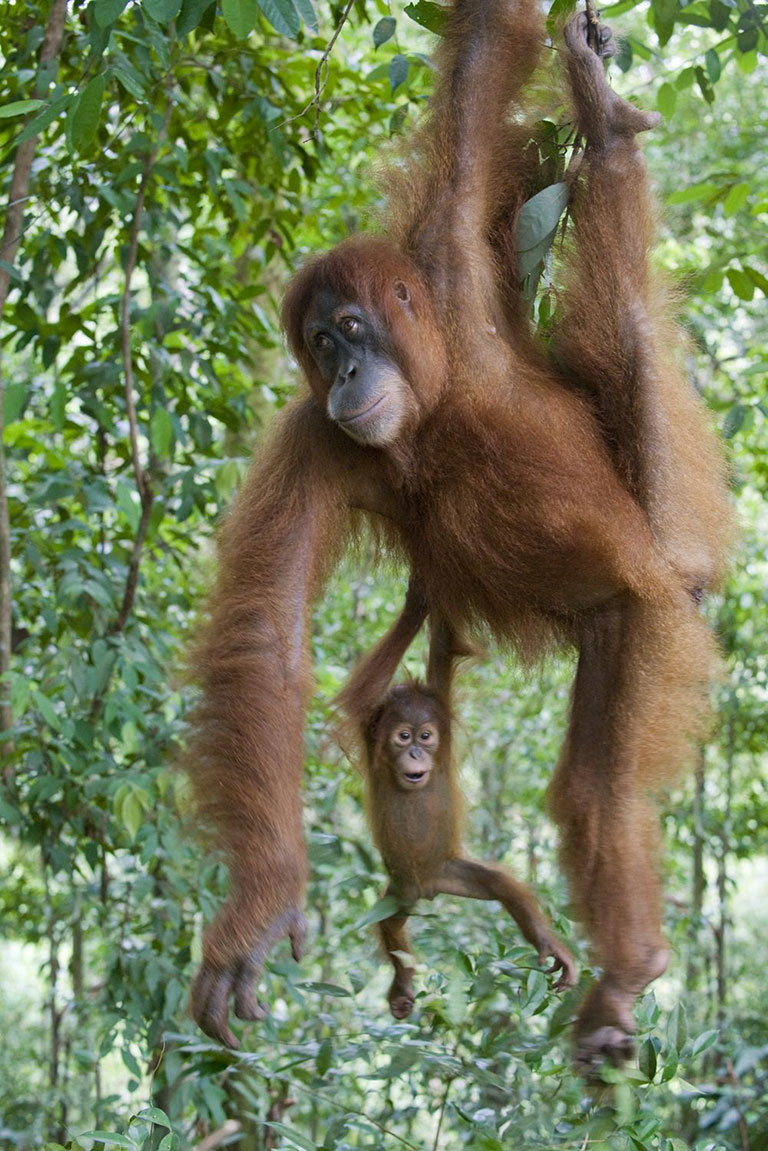
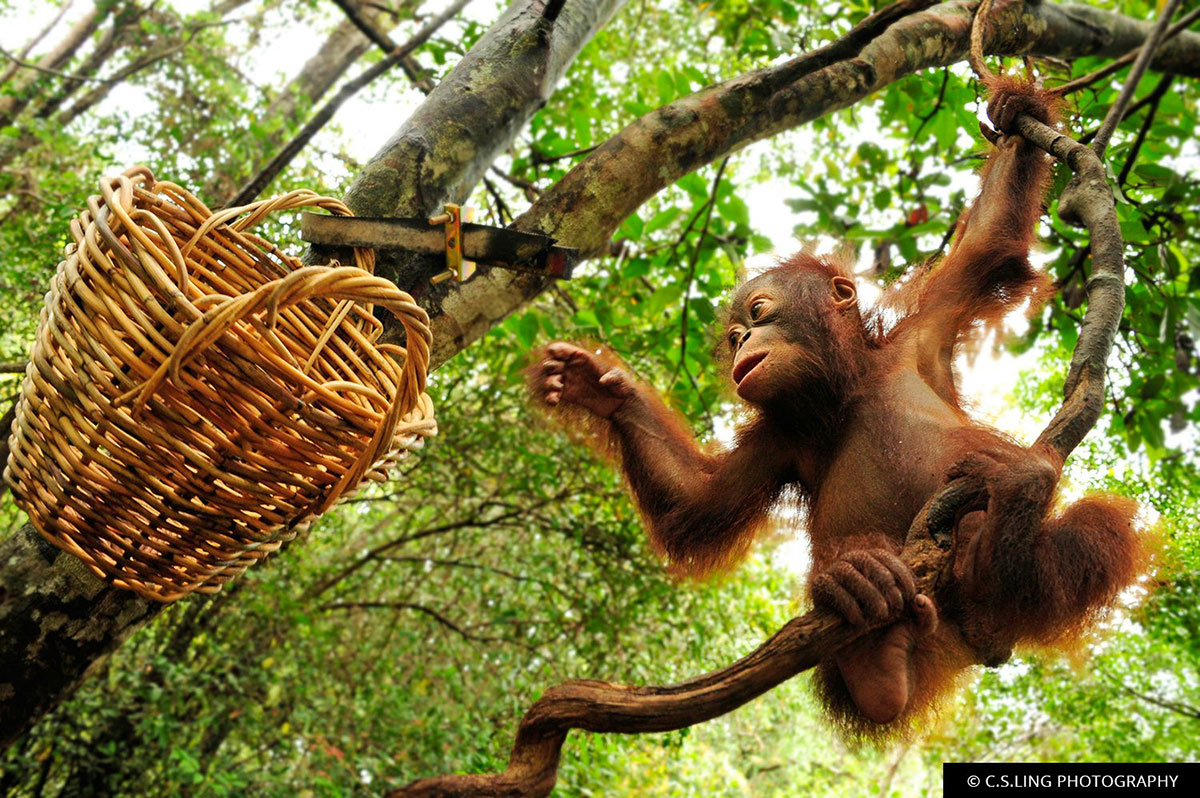
Orangutan Foundation International
Orangutan Foundation International (OFI) was established in 1971 by Dr. Biruté Mary Galdikas and her former husband. It was originally called Orangutan Research and Conservation Project. OFI is dedicated to the conservation of wild orangutans and their rainforest habitat, mainly in Borneo, and runs the Orangutan Care Center and Quarantine (OCCQ) near the Tanjung Puting National Park in southern Borneo. At the OCCQ, rescued orangutans receive medical, parental, and emotional care before being reintroduced into the wild. Orangutans rehabilitated in OCCQ are often released in Camp Leakey, an OFI research center deep within Tanjung Puting National Park. OFI also helps manage the Lamandau Wildlife Reserve, Camp Kerantungan, Camp Seluang Mas, and other release sites in and around Tanjung Puting, where rehabilitated wild-born ex-captive orangutans have been released into the wild. Through its different field programs, OFI provides employment for more than 200 local Indonesians. OFI relies on its supporters to continue its important work protecting wild orangutan populations, rainforests, and wildlife in Borneo. Click here to make a financial donation to OFI.
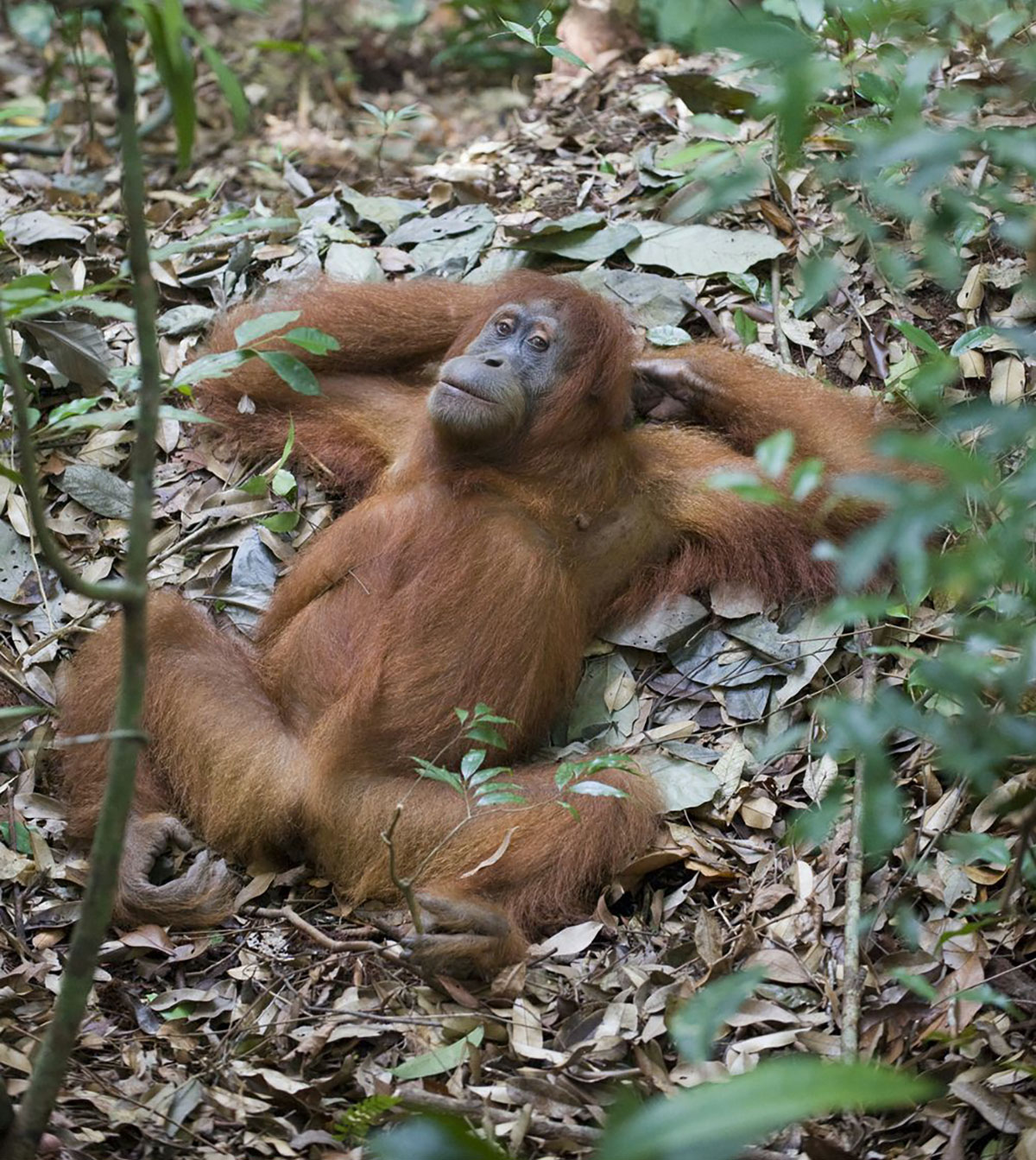
Educate friends, family and your community about the urgency of orangutan habitat loss and what can be done to reverse it

Tell your friends and family about the dire situation facing orangutans in Borneo and Sumatra. Show them some of the educational videos and documentaries on the subject. Join other animal activists in demanding an end to the destruction of their rainforest habitat. The Sumatran Orangutan Society website has a comprehensive take action page which describes numerous ways you can help orangutans, including creative fundraising ideas.
Post information on Facebook and other social media sites

Most orangutan advocacy organizations, including Borneo Orangutan Survival Foundation, Sumatra Orangutan Society, Orangutan Foundation International, and others have Facebook and Twitter accounts. Follow their pages and share photos and posts with your friends and family, keeping them up-to-date on important orangutan advocacy news and issues.
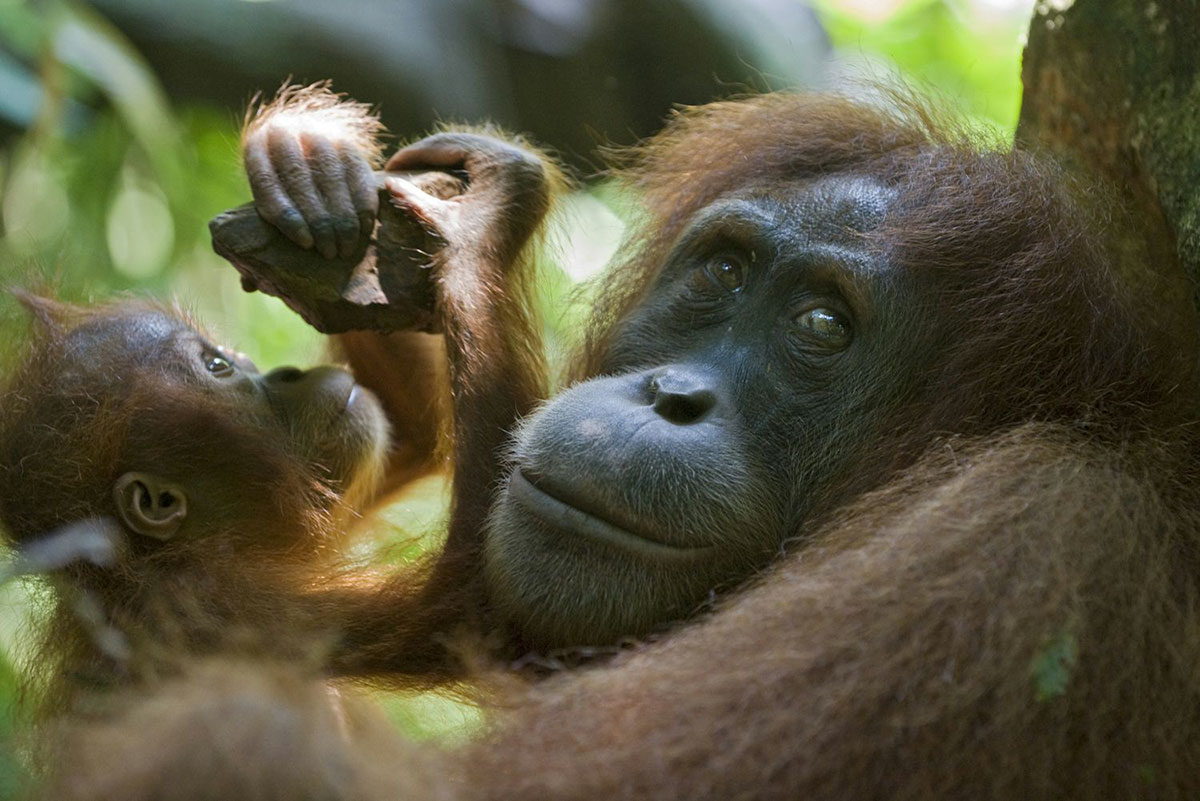

Facts
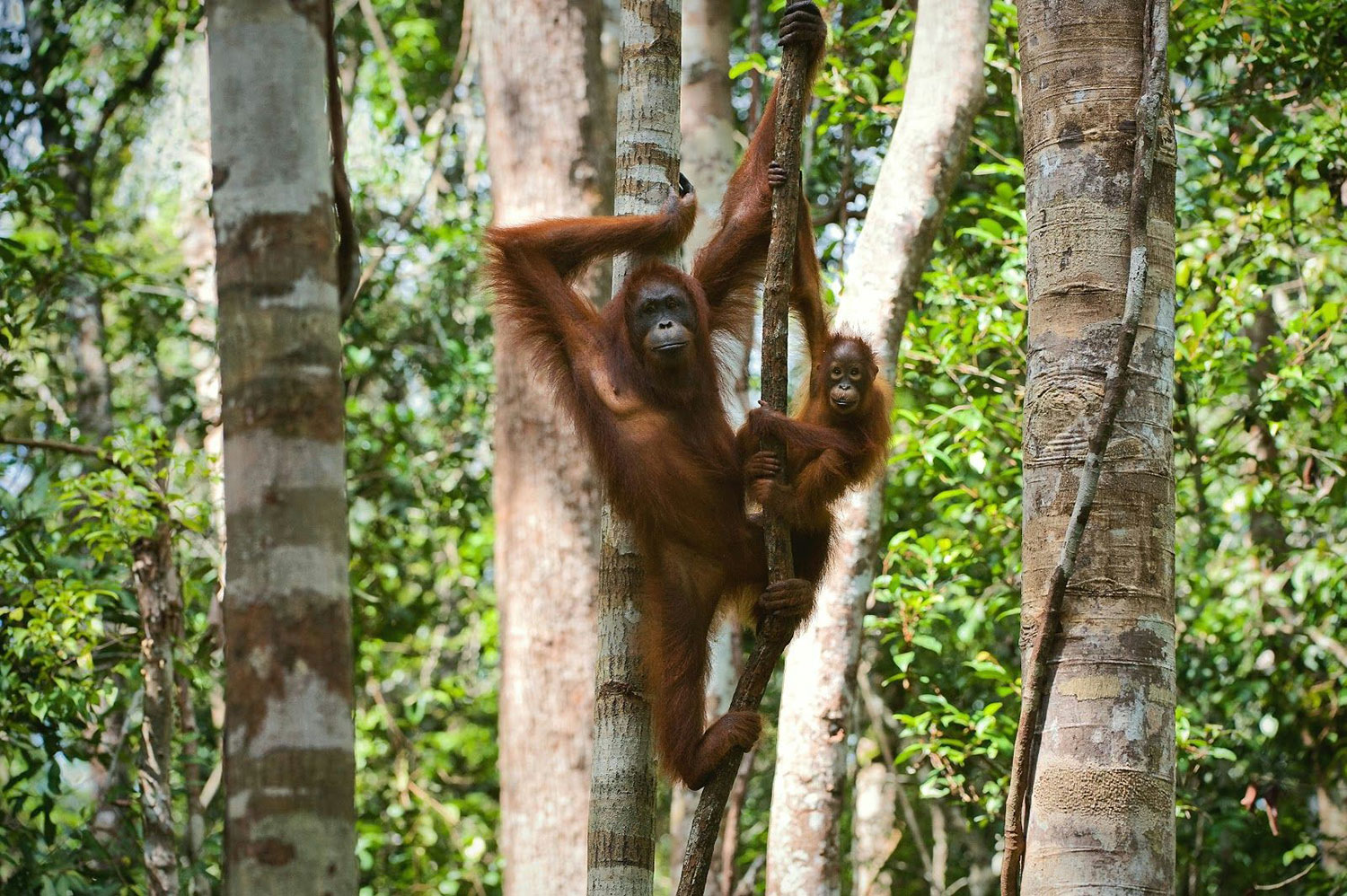
The only two places in the world where orangutans are found living in the wild are the Indonesian island of Sumatra and the Malaysian/Indonesian island of Borneo. Orangutan fossils, however, have been found in Vietnam, Java, and China. Other than humans, orangutans are the only great ape whose natural habitat is not in Africa. In the early 20th century, approximately 315,000 orangutans lived on Sumatra and Borneo. Today they are critically endangered.
The word orangutan is derived from the Indonesian and Malay words for “person” and “forest”, or “person of the forest.” Orangutans can live up to 45 years or more in the wild.
Unlike all the other great apes, orangutans prefer not to live in groups. Males and females generally come together only to mate. Mother orangutans live with their babies until the offspring reach about seven or eight years of age — longer than any other mammal except humans. Over 94% of human DNA is shared with orangutans.
Many primatologists now consider orangutans to be the world’s most intelligent animal other than humans. According to some scientists, their intellectual capacity and cognitive abilities are even more advanced than chimpanzees. They use large leaves to make umbrellas and leak-proof roofs over their sleeping nests and also use small sticks as tools to help extract honey from beehives.
Orangutans are arboreal, spending nearly their entire lives in trees. This is different than the other great apes, who spend a considerable amount of time on the ground. Like chimpanzees, orangutans make a different nest of leaves and branches every day to sleep in that night.
The arms of an orangutan are twice as long as their legs. Males can grow as tall as 5’9” and weigh as much as 260 lbs. In contrast, females only grow on average up to 4’2” on and rarely weigh over 110 lbs.
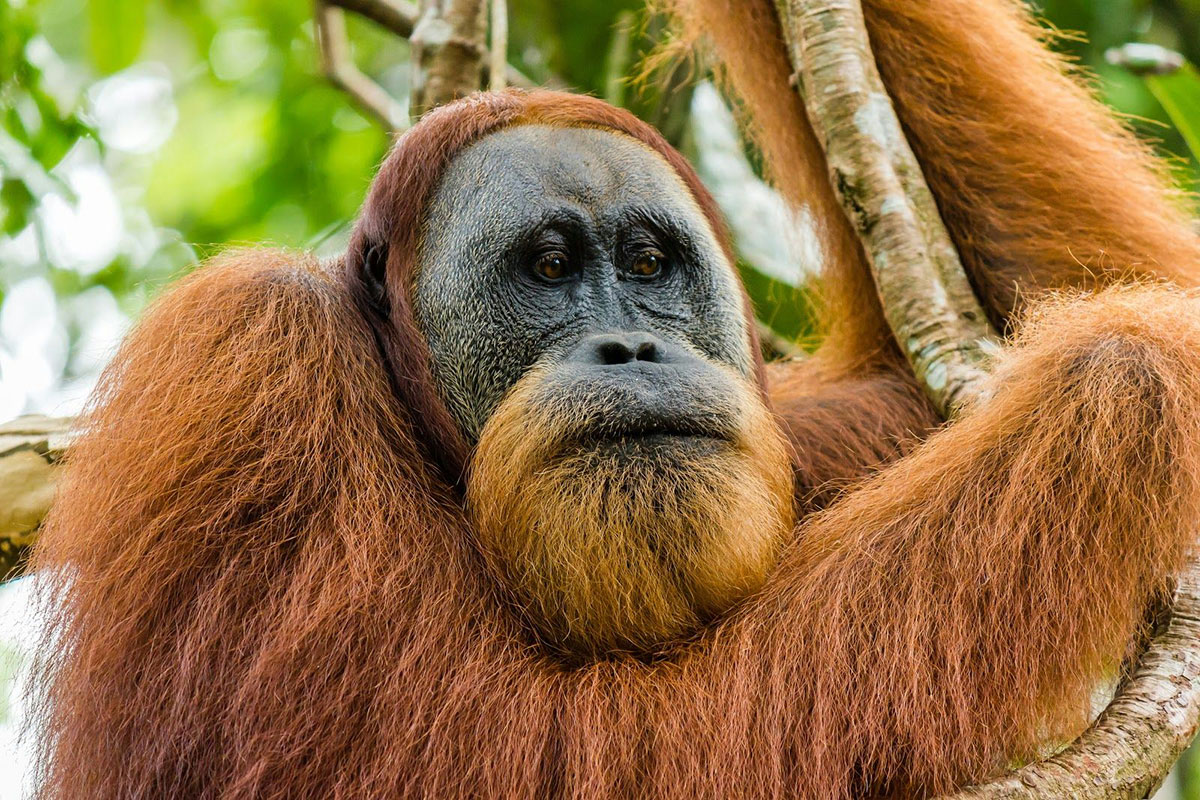

Explore
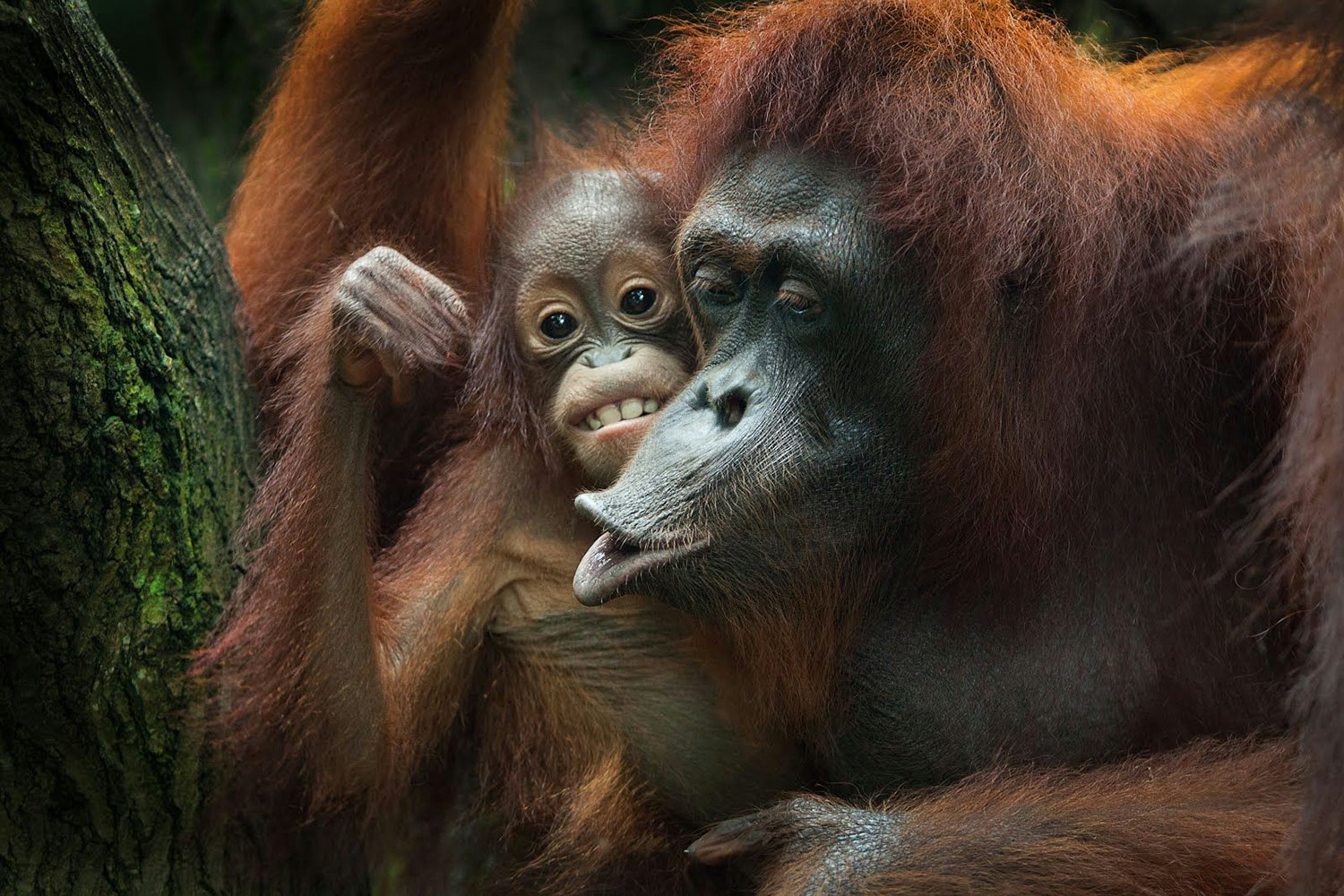
See

Explore the complex, emotional world of orangutans through these video clips and photographs and see how extraordinary these perceptive animals are.
Motherly Love
This mother orangutan was shot by poachers in Borneo. She was rescued and along with her child brought to Semenggoh Nature Reserve, where she fully recovered. She now lives and raises the child at the reserve. Watch this touching video and see how she watches over, cradles, and feeds the playful baby, even feeding him with her mouth.
Budi
For the first year of his life, Budi was kept in a tiny cage and fed only condensed milk. When International Animal Rescue rescued him, he was lonely, malnourished, and very frail. His limbs were swollen and bent. Even the simple movement of sitting up from a lying position was painful for him. Watch this video of Budi receiving medical care and affection for the first time in his life.
Budi Meets Jemmi
Like Budi, Jemmi is a baby orangutan orphan who was taken from his mother shortly after birth. Neither had ever seen another orangutan other than their mothers before being kidnapped. Watch this amazing video as they meet for the first time.
Best Friends Snacking
Budi and Jemmi have become best friends and spend all their time together. They even sleep in the same hammock at night. Watch this adorable video of the two enjoying a snack together.
Learning to Fly
Orangutans travel through the rainforests of Borneo and Sumatra by swinging high in the canopy from limb to limb. Their weight allows them to successfully swing far enough in the direction of the next tree to grab an adjoining limb. Baby orangutans simply aren’t heavy enough to accomplish this. Watch this adorable video of a mother orangutan helping her baby get to the next tree.
Orangutans and Ecotourism
In this short video, world-renowned primatologist, Dr Biruté Galdikas, guides us through Orangutan Foundation International’s Camp Leakey in the rain forest of Borneo and explains why ecotourism in Borneo and Sumatra is an important part of saving orangutans from extinction.
Listen

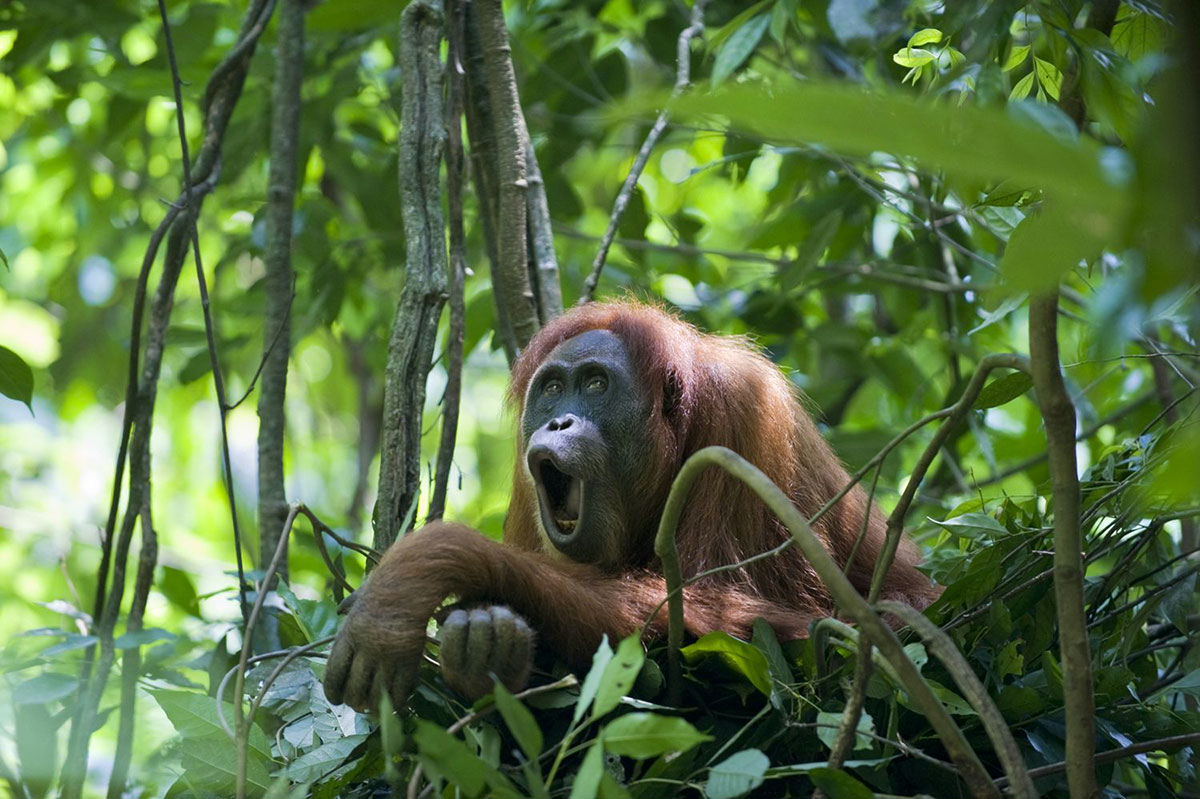
Orangutan interaction involves an assortment of both verbal and non-verbal methods. When communicating verbally, orangutans make kiss squeaks, grunts and “long calls” to express their feelings and desires. Scientific research has also shown that they communicate with other animals in the rainforest.
Orangutan Long Calls
Orangutans use a wide variety of calls to communicate with one another. Mature males are well known for their long-distance “long calls” which are a series of booming pulses and grumbles that can sometimes be heard through a mile of dense jungle. Listen to this male orangutan in action.
Back Off
In this video shot at the Tuanan Research Station in the Borneo rainforest, Niko, a male orangutan, uses a series of kiss squeaks and long calls to warn an observer not to get too close.
Interact

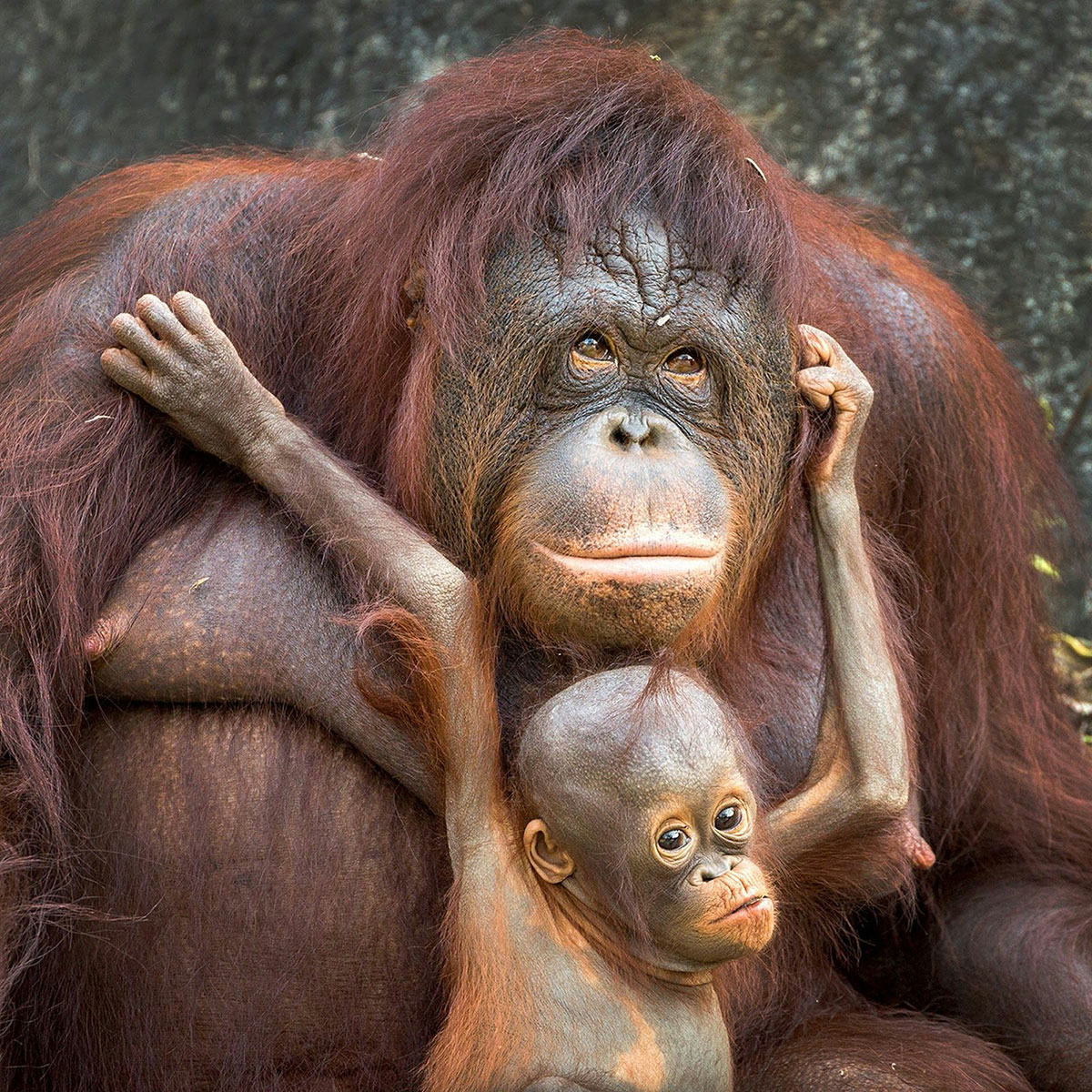
Through social media, you can become friends and connect with other committed activists from around the world who are fighting to keep orangutans from becoming the first great ape species to go extinct. Most orangutan advocacy organizations have social media pages that post news and important information about orangutans and the diminishing Borneo and Sumatra rainforests on a daily or weekly basis. The links for the social media accounts of some of these groups are listed below in addition to a link to their websites. Tell your friends, family, and communities about the dire situation facing the Bornean and Sumatran orangutans. Take Action!
Orangutan Voices
Learn

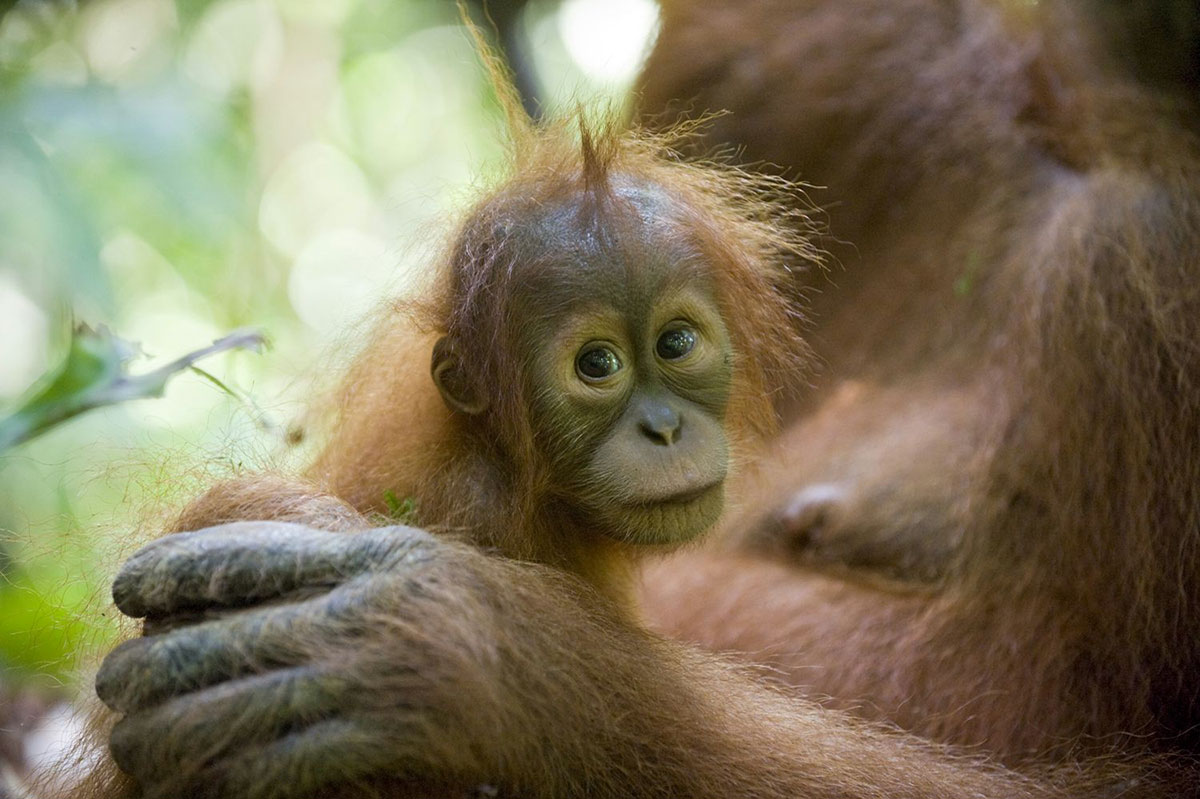
The Orangutan Foundation International (OFI) website is a fantastic resource for those looking to learn more about the fascinating lives of orangutans and how to save them and their rainforest habitat. OFI was founded in 1971 by Dr. Biruté Mary Galdikas, the world’s leading authority on orangutan behaviour and conservation. The website provides extensive information on how to make a positive difference for Sumatran and Bornean orangutans, no matter where you live in the world.
Watch

The following documentaries are great tools for anyone who wants to dive deeper into the world of orangutan intelligence and behavior. Several of these also provide an in-depth look at the people who are fighting to save orangutans and their rainforest habitat.
Green
Jungle of the Red Spirit
Orangutan: Man of the Forest
Borneo: Unmasking the Truth
Refugees of the Lost Rainforest
Thinkers of the Jungle
